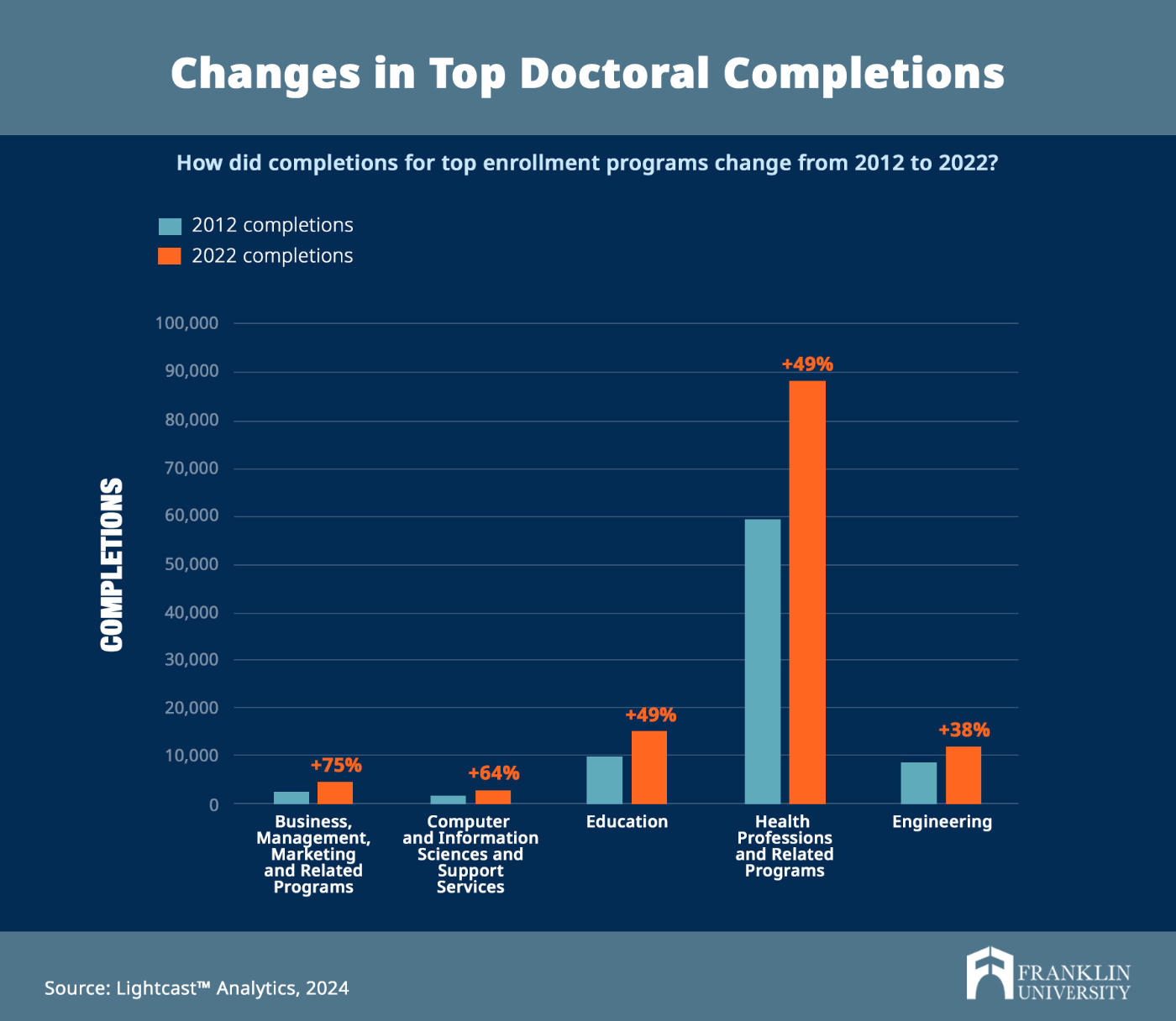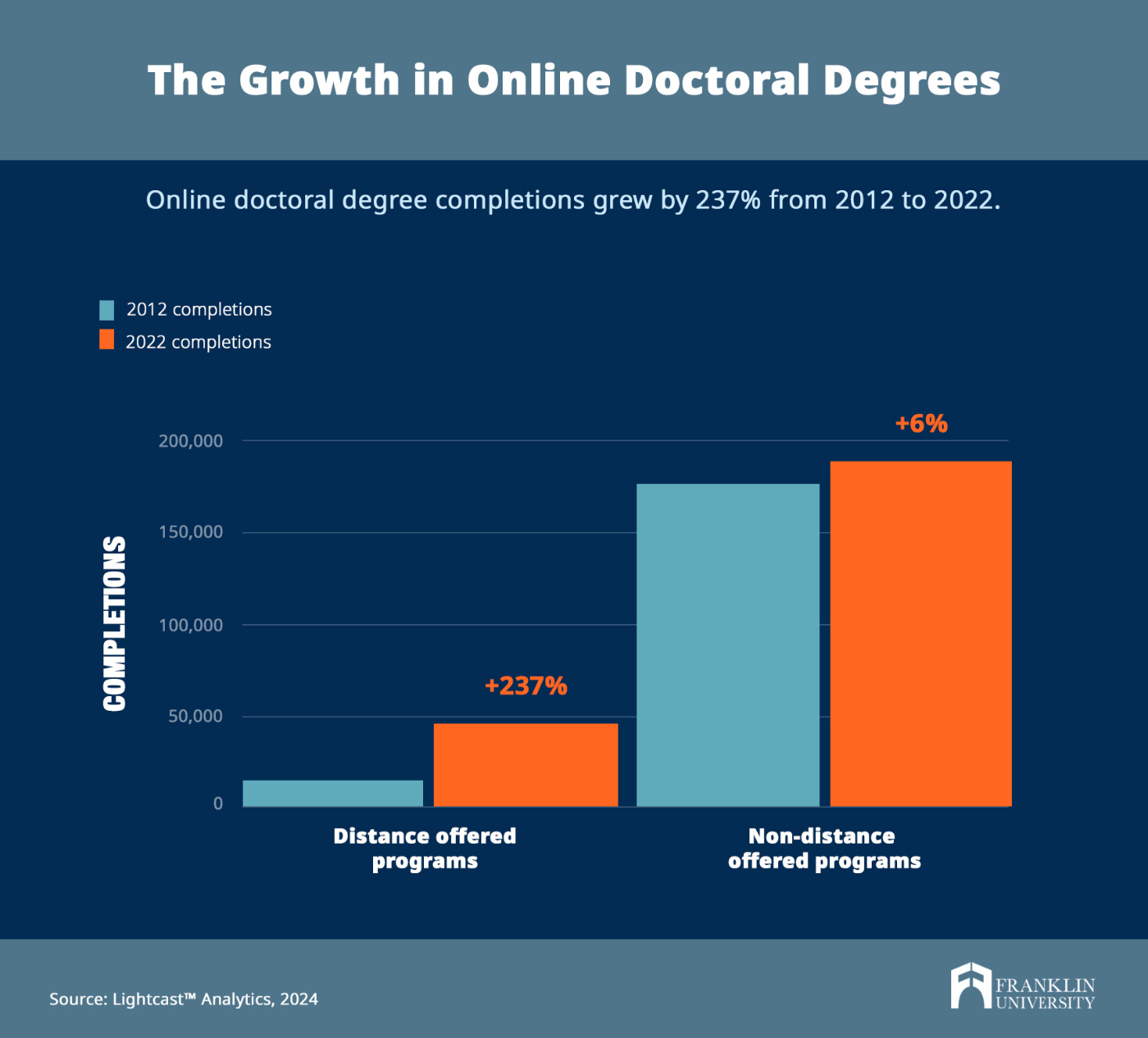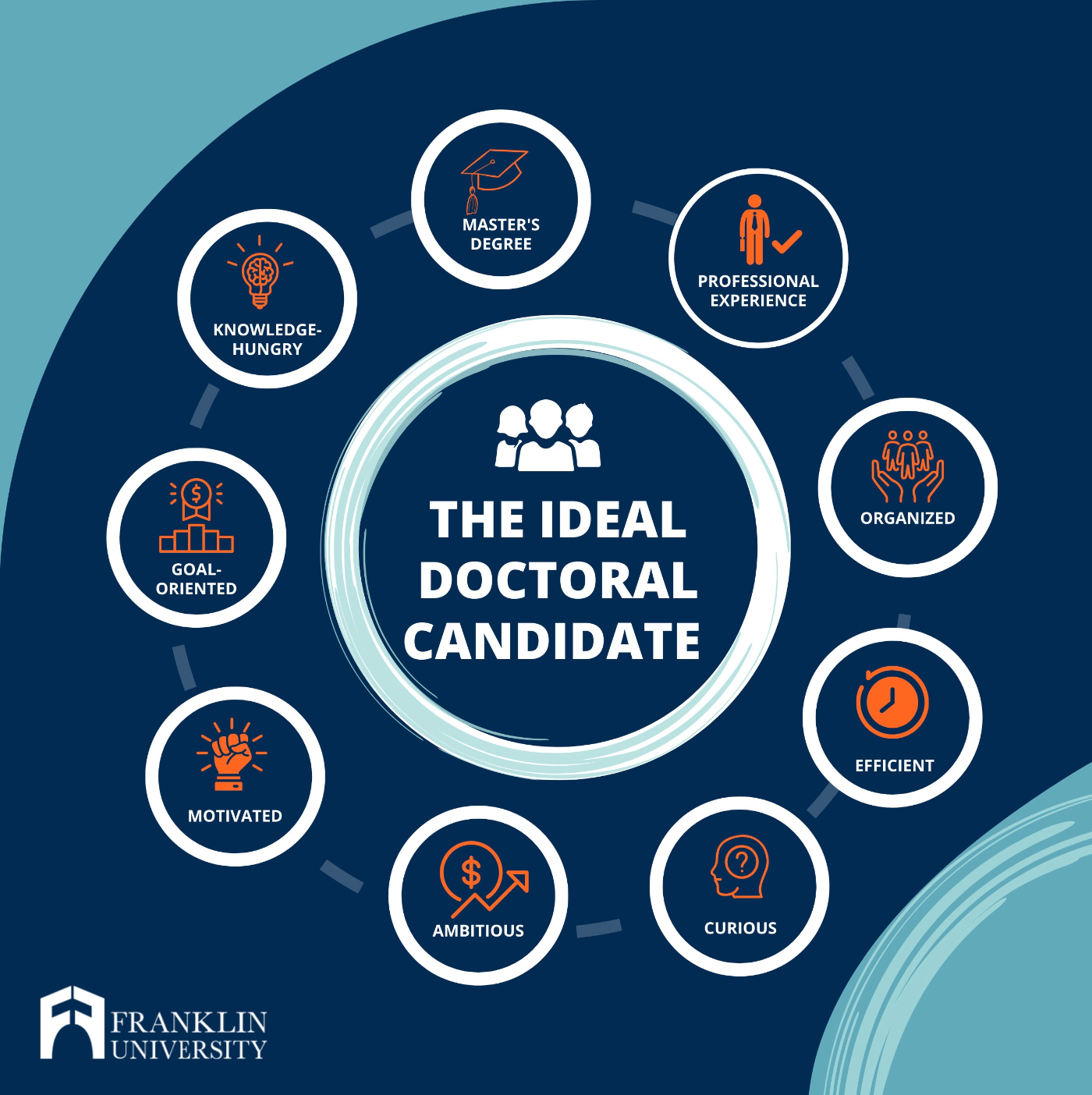

What is a PhD?
- Types of Doctorates
- A Doctor of Philosophy (PhD) is the highest globally recognized postgraduate degree that higher education institutions can award.
- PhDs are awarded to candidates who undertake original and extensive research in a particular field of study.
- Full time PhD programmes typically last three to four years, whilst part time PhD programmes typically last six to seven years.
- A PhD can lead to an academia teaching role or a career in research. A PhD can also equip you with skills suitable for a wide range of jobs unrelated to your research topic or academia.
Definition of a PhD – A Doctor of Philosophy (commonly abbreviated to PhD , Ph.D or a DPhil ) is a university research degree awarded from across a broad range of academic disciplines; in most countries, it is a terminal degree, i.e. the highest academic degree possible.
PhDs differ from undergraduate and master’s degrees in that PhDs are entirely research-based rather than involving taught modules (although doctoral training centres (DTCs) offer programmes that start with a year of lecture-based teaching to help develop your research skills prior to starting your project).
In most English-speaking countries, those that complete a PhD use the title “Doctor” (typically abbreviated to Dr) in front of their names and are referred to as such within academic and/or research settings. Those that work in fields outside of academia may decide not to use the formal doctor title but use post-nominal letters (e.g. John Smith PhD); it’s unusual though for someone to use both the Doctor title and post-nominal letters in their name.
PhD vs Doctorate
A PhD and a professional doctorate are both research-based terminal degrees.
However, where a PhD focuses on original research mostly around theoretical concepts, a professional doctorate focuses on examining existing knowledge to solve real-life, practical problems.
While there is much crossover between the two, a PhD is generally better suited for an individual to wants to advance the knowledge and understanding in their field, and a professional doctorate degree is better suited to a working professional who wants to better be able to apply knowledge and understanding to their field.
What Are the Entry Requirements for a PhD?
To be accepted on to a PhD programme, students usually need to hold at least a high ( 2:1 and above ) undergraduate degree that is related to the field of research that they want to pursue. A PhD candidate may also be expected to hold a Master’s degree , however, this does not mean you must have one, as it is still possible to enrol into a PhD without a Master’s .
Self-funded courses may sometimes be more relaxed in relation to entry requirements. It may be possible to be accepted onto a self-funded PhD programme with lower grades, though these students typically demonstrate their suitability for the role through professional work experience.
Whilst a distance learning project is possible , most PhD candidates will carry out their research over at least three years based at their university, with regular contact with two academic supervisors (primary and secondary). This is particularly the case for lab-based projects, however, some PhD projects require spending time on-site away from university (e.g. at a specialist research lab or at a collaborating institution abroad).
How Long Does a PhD Take?
Typically, full-time PhDs last 3-4 years and part-time PhDs last 6-7 years. However, at the discretion of the university, the thesis writing-up period can be extended by up to four years.
Although most doctoral programmes start in September or October, they are generally much more flexible than taught-courses and can start at any time of the year.
How Much Does a PhD Cost?
Tuition fees for UK and EU students vary between £3,000 and £6,000 per year, with the average tuition fee of £4,712 per year for 2023/24 programmes.
Tuition fees increase considerably for international students, varying between £16,000 to £25,000 per year, with an average tuition fee of £19,600 per year .
Nonetheless, most students will secure PhD funding in the form of studentships, scholarships and bursaries to help pay for these fees. These funding opportunities can either be partial, which cover tuition fees only, or full, which cover both tuition fees and living expenses.
UK national students can also apply for Doctoral Loans from Student Finance England if they are unable to secure funding.
Finding a PhD has never been this easy – search for a PhD by keyword, location or academic area of interest.
What Does a PhD Involve?
To be awarded a PhD, a doctoral student is required to produce a substantial body of work that adds new knowledge to their chosen field.
A PhD programme will typically involve four key stages:
Stage 1: Literature Review
The first year of a PhD involves attending regular meetings with your supervisors and carrying out a search on previously published work in your subject area. This search will be used to produce a literature review which should set the context of the project by explaining the foundation of what is currently known within the field of research, what recent developments have occurred, and where the gaps in knowledge are. In most cases, this will be an extension of your research proposal should you have produced one as part of your application. The literature review should conclude by outlining the overarching aims and objectives of the research project. This stage of setting achievable goals which are original and contribute to the field of research is an essential first step in a successful PhD.
The supervisor is the main point of contact through the duration of a PhD – but remember: they are there to mentor, not to teach, or do it for you . It will be your responsibility to plan, execute and monitor your own work as well as to identify gaps in your own knowledge and address them.
Stage 2: Research
The second year (and prehapse some of your third year) is when you work on your research. Having identified novel research questions from your review of the literature, this is where you collect your data to help answer these questions. How you do this will depend on the nature of your doctoral research: for example, you may design and run experiments in a lab alongside other PhD students or visit excavation sites in remote regions of the world. You should check in regularly with your supervisors to update them and run any ideas or issues past them.
Have the structure and chapters of your thesis in mind as you develop and tackle your research questions. Working with a view of publishing your work will be very valuable later on.
Stage 3: Write up of Thesis
The next key stage of a PhD is writing a doctoral thesis , which typically takes from anywhere between three months to one year. A thesis is a substantial body of work that describes the work and outcomes of the research over the previous two to three years. It should tell a detailed story of the PhD project – focusing on:
- The motivations for the research questions identified from the literature review.
- The methodologies used, results obtained, and a comprehensive analysis and discussion of the findings.
- A detailed discussion of the key findings with an emphasis on the original contributions made to your field of research and how this has been impactful.
There is no universal rule for the length of a PhD thesis, but general guidelines set the word count between 80,000 to 100,000 words.
For your thesis to be successful, it needs to adequately defend your argument and provide a unique or increased insight into your field that was not previously available.
Stage 4: Attending the Viva
A viva voce , most commonly referred to as just a ‘ viva ‘, is an interview-style examination where the PhD student is required to engage in a critical appraisal of their work and defend their thesis against at least two examiners. The examiners will ask questions to check the PhD student has an in-depth understanding of the ideas and theories proposed in their thesis, and whether they have developed the research skills that would be expected of them.
The viva is one of the final steps in achieving a PhD, and typically lasts at least two hours, but this duration can vary depending on the examiners, the university and the PhD project itself.
Once you have done the viva – you’re on the home stretch. You will typically be asked to make some amendments to your thesis based on the examiner’s feedback. You are then ready to submit your final thesis for either:
- PhD – If you pass the requirements you will be awarded a PhD degree (most common outcome),
- MPhil – If you failed to meet requirements for a PhD, you may be downgraded to an MPhil degree (uncommon outcome),
- Fail – No award is given, typically for cases of plagiarism (extremely uncommon outcome).
What Is It Like to Undertake a PhD?
We’re often asked what it is like to undertake a PhD study. Unfortunately, this isn’t a simple answer to this question as every research project is different.
To help give insight into the life of a PhD student, we’ve interviewed PhD students at various stages of their programmes and put together a series of PhD Student Interviews . Check out the link to find out what a PhD is like and what advice they have to offer you.
What Are the Benefits of A PhD?
A PhD is the highest globally recognised postgraduate degree that higher education institutions can award. The degree, which is awarded to candidates who demonstrate original and independent research in a particular field of study, is not only invaluable in itself, but sets you up with invaluable skills and traits.
Career Opportunities
First, a PhD prepares you for a career in academia if you wish to continue in this area. This takes form as a career in the Higher Education sector, typically as a lecturer working their way to becoming a professor leading research on the subject you’ve studied and trained in.
Second, a PhD also enables the opportunity for landing a job in a research & development role outside of the academic environment. Examples of this include laboratory work for a private or third sector company, a governmental role and research for commercial and industrial applications.
Transferable Skills
Finally, in possessing a PhD degree, you can show to employers that you have vital skills that make you an asset to any company. Three examples of the transferable skills that you gain through a PhD are effective communication, time management, and report writing.
- Communication – presenting your work in written and oral forms using journal papers and podium presentations, shows your ability to share complex ideas effectively and to those with less background knowledge than you. Communication is key in the professional environment, regardless of the job.
- Time management – The ability to prioritise and organise tasks is a tremendous asset in the professional industry. A PhD holder can use their qualification to demonstrate that they are able to manage their time, arrange and follow a plan, and stick to deadlines.
- Report writing – Condensing three years of work into a thesis demonstrates your ability to filter through massive amounts of information, identify the key points, and get these points across to the reader. The ability to ‘cut out the waffle’ or ‘get to the point’ is a huge asset in the professional industry.
Aside from the above, you also get to refer to yourself as a Doctor and add fancy initials after your name!
What Can I Do After a PhD?
One of the most desirable postdoctoral fields is working within independent Research and Development (R&D) labs and new emerging companies. Both industries, especially R&D labs, have dedicated groups of PhD graduates who lead research activities, design new products and take part in crucial strategic meetings. Not only is this a stimulating line of work, but the average salaries in R&D labs and emerging start-ups are lucrative. In comparison, an undergraduate with five years of experience within their given field will, on average, likely earn less than a new PhD graduate taking on a R&D position.
It’s a common misunderstanding that PhDs only opens the door for an academic career such as university lecturers and training providers. Although obtaining a PhD opens these doors, the opportunities extend far beyond educational roles. In fact, recent data from the UK’s Higher Education Statistics Agency (HESA) indicates only 23% of PhD graduates take a position in educational roles . This low percentage is primarily because PhD graduates have a wide range of skills that make them suitable for a broad spectrum of roles. This is being seen first hand by the increasing number of PhD graduates who are entering alternative roles such as research, writing, law and investment banking.
How Do I Find a PhD?
We appreciate that finding a PhD programme to undertake can be a relatively daunting process. According to Higher Education Student Statistics , over 22,000 PhDs were awarded in 2016/17 within the United Kingdom alone. Clearly there are a huge number of PhD programmes available. This can sometimes be confusing for prospective doctorates, particularly when different programmes are advertised in different places. Often, it is difficult to know where to look or where to even start. We’ve put together a list of useful sources to find the latest PhD programmes:
- A great place to start is with our comprehensive and up-to-date database of available PhD positions .
- Assuming you are still at university, speak to an existing PhD supervisor within your department.
- Attend as many postgraduate open days as you can. Whilst there, speak to current PhD students and career advisors to get an awareness of what PhDs are on offer.
- Visit the postgraduate section of university websites and the PhD Research Council section of the UKRI website.
Browse PhDs Now
Join thousands of students.
Join thousands of other students and stay up to date with the latest PhD programmes, funding opportunities and advice.
What is a PhD? Advice for PhD students
How long does it take to get a doctorate degree how do you get into grad school are you qualified to do a phd answers to these questions and more.
What is a PhD?
A PhD, which stands for “doctor of philosophy”, is the most advanced academic degree. It’s earned through extensive research on a specific topic, demonstrating expertise and contributing new knowledge to the field.
What does “PhD” mean?
The term “PhD” is often used as a synonym for any doctoral-level qualification. Doctorate degrees can often be split into two categories: MPhil and PhD.
An MPhil is similar to a PhD as it includes a research element (which is usually shorter and less in-depth than a PhD thesis, and often more akin to a dissertation undertaken at undergraduate or master’s level).
MPhil students focus more on interpreting existing knowledge and theory and critically evaluating other people’s work rather than producing their own research. The precise nature and definition of an MPhil can vary among institutions and countries.
A PhD, meanwhile, follows a more widely known and traditional route and requires students, often referred to as “candidates”, to produce their own work and research on a new area or topic to a high academic standard.
PhD requirements vary significantly among countries and institutions. The PhD, once completed, grants the successful candidate the title of “doctor of philosophy”, also called PhD or DPhil.
What is a professional doctorate?
A professional doctorate is a kind of degree that helps people become experts in their fields. Instead of focusing mainly on theory and research like a regular PhD, a professional doctorate is all about practical skills and knowledge.
This kind of doctorate is great for students who want to get better at their jobs in areas like teaching, healthcare, business, law or psychology. The courses and projects in these programmes are designed to tackle real problems you might face at work.
For example, you might have heard of the doctor of education (EdD), doctor of business administration (DBA), doctor of psychology (PsyD) or doctor of nursing practice (DNP). These programmes combine learning, hands-on projects and sometimes a thesis paper or essay to show you’re skilled at solving on-the-job challenges.
How long does it take to study a PhD?
The time required to complete a PhD can vary significantly based on several factors. Generally, a full-time PhD programme takes around three to six years to finish. However, it’s important to take into account individual circumstances and the nature of the research involved.
1. Full-time vs. part-time: If you’re studying full-time, dedicating most of your time to your studies, it usually takes about three to four years to complete a PhD. However, studying part-time while managing other commitments might extend the duration. Part-time PhDs can take around six to eight years, and sometimes even longer.
2. Nature of research: The complexity of your research proposal can influence the time required. Certain research questions may involve intricate experiments, extensive data collection or in-depth analysis, potentially leading to a longer completion timeline.
3. Field of study: The subject area you’re researching can also affect the necessary time. Some fields, such as sciences or engineering, might involve more hands-on work, while theoretical subjects might require more time for literature review and analysis.
4. Supervision and support: The guidance and availability of your academic supervisor can affect the pace of your research progress. Regular meetings and effective communication can help keep your studies on track.
5. Thesis writing: While the research phase is crucial, the stage of writing your thesis is equally significant. Organising and presenting your research findings in a clear and cohesive manner can take several months.
6. External commitments: Personal commitments, such as work, family or health-related factors, can influence your study time. Some students need to balance these alongside their PhD studies, potentially extending the duration.
7. External Funding: The availability of funding can also affect your study duration. Some funding might be linked to specific project timelines or research objectives.
So, although a PhD usually takes between three and six years of full-time study, with potential variations based on research complexity, enrolment as part-time or full-time, field of study and personal circumstances. It’s vital to have a realistic understanding of these factors when planning your PhD journey.
How long is a PhD in the UK?
In the UK, the length of a PhD programme typically ranges from three to four years of full-time study. As explained above, there are many factors to consider.
How long is a PhD in the US?
Similarly to the UK, in the United States, the duration of a PhD programme can vary widely depending on the field of study, research topic and individual circumstances. On average, a full-time PhD programme in the US typically takes between five and six years to complete.
Why does it take longer to study a PhD in the US?
PhD programmes generally take longer to complete in the US than in the UK due to various factors in the education systems and programme structures of each country:
1. Programme structure: UK PhD programmes often emphasise early, focused research from the first year, leading to shorter completion times. In contrast, US programmes commonly include more initial coursework in your first and second year and broader foundational training, which can extend the overall duration.
2. Course work requirements: Many US PhD programmes require a lot of course work, which can lengthen the time needed to finish. UK programmes tend to have fewer or no course work demands, allowing students to concentrate primarily on research skills.
3. Research funding: In the UK, PhD funding is often awarded with specific timeframes in mind, motivating completion of the research degree in the agreed duration. In the US, funding approaches can vary, requiring students to secure funding from multiple sources, potentially affecting their progress and completion time.
4. Teaching responsibilities: Some US PhD students take on teaching roles as part of their funding, dividing their time and potentially prolonging their studies.
5. Research approach: Differences in research methodologies and project scopes can affect the time needed for data collection, experimentation and analysis.
6. Academic culture: The US education system values a well-rounded education, including coursework and comprehensive exams. This can extend the time before full-time research begins. UK PhD programmes often prioritise independent research early on.
7. Part-time and work commitments: US PhD candidates might have more flexibility for part-time work or other commitments, which can affect research progress.
8. Dissertation requirements: US PhD programmes generally include a longer and more comprehensive dissertation, involving more chapters and a broader exploration of the research topic.
These variations in programme structures, funding models and academic cultures contribute to the differing completion times between the two countries.
What qualifications do you need for a PhD?
To be eligible for a PhD programme, certain educational qualifications are generally expected by universities. These qualifications serve as indicators of your readiness to engage in advanced research and contribute to the academic community.
First, an undergraduate or bachelor’s degree in a relevant field is typically the most common requirement. This degree provides you with a foundational understanding of the subject and introduces you to basic research methodologies. It serves as a starting point for your academic journey.
Do you need a master’s degree to get into a PhD programme?
In addition to an undergraduate degree, many PhD programmes also require candidates to hold postgraduate or master’s degrees, often in fields related to the intended PhD research. A master’s degree offers a deeper exploration of the subject matter and enhances your research skills. Possessing a master’s degree signifies a higher level of expertise and specialisation.
The combination of both undergraduate and postgraduate degrees demonstrates a solid academic background. This background is crucial before you engage in doctoral study because pursuing a PhD involves more than just knowledge; it requires advanced research abilities, critical thinking and the capacity to provide an original contribution and new insights into the chosen field of study.
While these qualifications are usually requested, there are exceptions. Some institutions offer direct-entry programmes that encompass bachelor’s, master’s and PhD degrees in a streamlined structure. This approach is often seen in scientific and engineering disciplines rather than humanities.
In exceptional cases, outstanding performance during undergraduate studies, coupled with a well-defined research proposal, might lead to direct entry into a PhD programme without requiring a master’s degree.
Admission requirements can vary between universities and programmes. Some institutions might have more flexible prerequisites, while others could have more stringent criteria. Make sure that you thoroughly research all admission requirements of the PhD programmes you’re interested in to ensure you provide the right information.
Are PhD entry requirements similar in other countries?
PhD entry requirements in Canada and Australia can be somewhat similar to those in the UK and the US, but there are also some differences. Just like in the UK and the US, having a bachelor’s degree followed by a master’s degree is a common way to qualify for a PhD in Canada and Australia. However, the exact rules can vary, such as how much research experience you need or the grades you should have.
In Canada and Australia, as in the UK and the US, international students usually need to show their English language skills through tests like IELTS or TOEFL. And, like in other places, you might need to give a research proposal to explain what you want to study for your PhD.
But remember, even though there are some similarities, each country has its own rules.
PhD diary: Preparing for a PhD Nine things to know before doing a PhD Women in STEM: undertaking PhD research in cancer Studying for a part-time PhD: the challenges and the benefits Is it possible to do a three-year PhD as an international student? Looking for PhD tips? Why not check Twitter PhD diary: Where do I begin? How to do a PhD on a budget
How much does it cost to study a PhD?
The cost of pursuing a PhD can vary significantly between international and home (domestic) students, and it depends on the country, university and programme you choose.
United Kingdom (UK)
Home students in the UK often pay lower tuition fees compared with international students. Home students might also have access to government funding or subsidised tuition rates.
International students typically pay higher tuition fees, which can vary widely depending on the university and programme. Fees can range from around £10,000 to £25,000 or more per year.
United States (US)
PhD programme costs in the US can be quite high, especially for international students. Public universities often have lower tuition rates for in-state residents compared with out-of-state residents and international students.
Private universities in the US generally have higher tuition fees, and international students might be charged higher rates than domestic students.
Canadian universities often charge higher tuition fees for international students compared with domestic students.
Some universities offer funding packages that include tuition waivers and stipends for both domestic and international doctoral students.
In Australia, domestic students (Australian citizens and permanent residents) usually pay lower tuition fees than international students.
International students in Australia might have higher tuition fees, and costs can vary based on the university and programme.
Apart from tuition fees, other aspects play a role in the overall financial consideration:
PhD studentship: Many universities offer PhD studentships that provide financial support to research students, covering both tuition fees and a stipend for living expenses.
Stipend and housing: Stipends are designed to cover living expenses. Stipend amounts can vary depending on the university and location. If you’re studying in London in the UK, stipends might be higher to account for the higher living costs in the city. Some universities also offer subsidised or affordable housing options for doctoral students.
Tuition and stipend packages: Some PhD programmes provide funding packages that include both tuition waivers and stipends. These packages are to help relieve the financial burden on students during their doctoral studies.
Research the financial support options provided by the universities you’re interested in to make an informed decision about the cost of your PhD journey.
What funding options are available for PhD candidates?
PhD candidates have various funding options available to support their studies and research journeys. Some of these options include:
PhD scholarships: Scholarships are a common form of financial aid for PhD candidates. They are awarded based on academic merit, research potential or other specific criteria. Scholarships can cover tuition fees and provide a stipend for living expenses.
Bursaries: Bursaries are another form of financial assistance offered to students, including PhD candidates, based on financial need. They can help cover tuition fees or provide additional financial support.
In the UK, specific funding options are available:
Regional consortium: Some regions have research consortiums that offer funding opportunities for doctoral candidates. These collaborations can provide financial support for research projects aligned with specific regional needs.
UK research institute: Research councils in the UK often offer stipends to PhD candidates. These stipends cover living expenses and support research work.
University-based studentship: Many UK universities offer studentships. You can read more about these above.
In the USA, there are also funding options available:
Research assistantships (RAs): Many universities offer research assistantships where PhD candidates work on research projects under the guidance of faculty members. In exchange, they receive stipends and often have their tuition waived.
Teaching assistantships (TA): Teaching assistantships involve assisting professors in teaching undergraduate courses. In return, PhD candidates receive stipends and sometimes tuition remission.
Fellowships: Fellowships are competitive awards that provide financial support for PhD candidates. They can come from universities, government agencies, private foundations and other institutions. Fellowships can cover tuition, provide stipends and offer research or travel funds.
Graduate assistantships: Graduate assistantships include a range of roles, from research and teaching to administrative support. These positions often come with stipends and sometimes include tuition benefits.
External grants and fellowships: PhD candidates can apply for grants and fellowships from external organisations and foundations that support research careers in specific fields. Examples include the National Science Foundation (NSF) and the Fulbright Programme.
Employer sponsorship: In some cases, employers might sponsor employees to pursue PhDs, especially if the research aligns with the company’s interests.
You can read about the current available scholarships for international students of all education levels on our website .
What does a PhD Involve?
How does a PhD work?
A PhD includes thorough academic research and significant contributions to your chosen field of study. The timeline for completing a PhD can significantly vary based on the country, college or university you attend and the specific subject you study.
The duration of a PhD programme can vary based on factors such as the institution’s requirements and the academic discipline you’re pursuing. For instance, the timeline for a PhD in a science-related field might differ from that of a humanities discipline.
UK PhD timeline example
Looking at a typical PhD degree in a London higher education institution, we can consider this example timeline.
In the initial year of your PhD, you’ll collaborate closely with your designated academic supervisor. This collaboration involves refining and solidifying your research proposal, which lays the foundation for your entire doctoral journey.
This is also the time to establish a comprehensive plan, complete with well-defined milestones and deadlines. A crucial aspect of this year is conducting an extensive literature review, immersing yourself in existing academic works to understand the landscape of your chosen research area. It’s important to make sure that your research idea is original and distinct from prior studies.
As you begin the second year, you’ll actively collect data and gather information related to your research topic. Simultaneously, you’ll initiate the process of crafting your thesis. This involves combining your research findings and analysis into sections of your thesis document.
This is also the phase where you might have opportunities to share your research insights at academic meetings, conferences or workshops. Depending on the programme, you might even engage in teaching activities. Some PhD candidates also begin contributing to academic journals or books, showcasing their findings to a broader audience.
The third year of a PhD programme often marks the final stage of your research efforts. This is when you dedicate substantial time to writing and finalising your complete thesis. Once your thesis is completed to the highest standard, you’ll submit it for thorough evaluation.
A significant milestone in the third year is the viva voce, an oral examination where you’ll defend your thesis before a panel of experts in your field. The viva voce is an opportunity to showcase your deep understanding of your research and defend your findings.
Why should you do a PhD?
For many people, acquiring a doctorate degree is the pinnacle of academic achievement, the culmination of years of commitment to higher education.
However, the act of pursuing a PhD can be a complex, frustrating, expensive and time-consuming exercise. But with the right preparation, some sound advice and a thorough understanding of the task at hand, your years as a doctoral student can be some of the most rewarding of your life.
People choose to work towards a doctorate for many reasons. If you are looking to pursue an academic position, such as university lecturer or researcher, then a PhD is usually required.
Many people obtain a PhD as part of a partnership with an employer, particularly in scientific fields such as engineering, where their research can prove useful for companies.
In some cases, however, PhDs are simply down to an individual’s love of a subject and their desire to learn more about their field.
What are some benefits of studying a PhD?
Pursuing a PhD can have many benefits that extend beyond academic achievement, encompassing personal growth, professional advancement and meaningful contributions to knowledge.
One of the most notable benefits of a PhD is the potential for tenure in academia. Attaining tenure provides a level of job security that allows you to delve into long-term research projects and make enduring contributions to your field. It signifies a stage where you can explore innovative ideas and pursue in-depth research, fostering your academic legacy.
While not obligatory, the opportunity to collaborate on research projects with your supervisor is another valuable aspect of a PhD pursuit. These collaborations might even come with financial compensation, offering real-world experience, skill development and practical applications of your research. Engaging in such collaborations can enrich your research portfolio and refine your research methodologies.
A pivotal aspect of a PhD journey is the chance to publish your original research findings. By disseminating your work in academic journals or presenting it at conferences, you contribute to the expansion of knowledge within your field. These publications establish your expertise and reputation among peers and researchers worldwide, leaving a lasting impact.
The pursuit of a PhD can provide a unique platform to build a diverse network of colleagues, mentors and collaborators. Engaging with fellow researchers, attending conferences and participating in academic events offer opportunities to make valuable connections. This network can lead to collaborations, expose you to a spectrum of perspectives and pave the way for future research endeavours.
What is a PhD thesis? And what is a PhD viva?
A PhD thesis will be produced with help from an academic supervisor, usually one with expertise in your particular field of study. This thesis is the backbone of a PhD, and is the candidate’s opportunity to communicate their original research to others in their field (and a wider audience). PhD students also have to explain their research project and defend their thesis in front of a panel of academics. This part of the process is often the most challenging, since writing a thesis is a major part of many undergraduate or master’s degrees, but having to defend it from criticism in real time is arguably more daunting. This questioning is known as a “viva”, and examiners will pay particular attention to a PhD’s weaknesses either in terms of methodology or findings. Candidates will be expected to have a strong understanding of their subject areas and be able to justify specific elements of their research quickly and succinctly.
In rare cases, students going for a PhD may instead be awarded an MPhil if the academic standard of their work is not considered fully up to par but still strong enough to be deserving of a qualification.
Can you do a PhD part time?
Many PhD and MPhil candidates choose to pursue their qualification part time, in order to allow time to work and earn while studying. This is especially true of older students, who might be returning to academia after working for a few years.
When applying, you should always speak to the admissions team at your university to ensure this is possible and then continue to work with your supervisor to balance all your commitments.
Can I do a PhD through distance learning?
This is something else that you will need to check with your university. Some institutions offer this option, depending on the nature of your research.
You will need to be clear how many times you will need to travel to your university to meet with your supervisor throughout your PhD.
Your PhD supervisor
Choosing the right PhD supervisor is essential if you want to get the most out of your PhD. Do your research into the faculty at the institution and ensure that you meet with your proposed supervisor (either virtually or in person) before fully committing.
You need to know that not only do they have the right expertise and understanding of your research but also that your personalities won’t clash throughout your PhD.
Remember, to complete your PhD, you will need a strong support network in place, and your supervisor is a key part of that network.
Coping with PhD stress
If you do decide to embark on a doctorate, you may well encounter stress and anxiety. The work involved is often carried out alone, the hours can be long and many students can suffer from the pressure they feel is on their shoulders.
Ensuring that you check in regularly with your emotions and your workload is crucial to avoid burnout. If you have other commitments, such as a job or a family, then learning to balance these can feel overwhelming at times.
Give yourself regular breaks, speak to your supervisor and ensure that you know what university resources and support systems are available to you in case you need to access them.
Post-doctorate: what happens after you finish your PhD?
Many PhD graduates pursue a career in academia, while others will work in industry. Some might take time out, if they can afford to, to recover from the efforts of PhD study.
Whatever you choose to do, undertaking a PhD is a huge task that can open up a range of doors professionally. Just remember to take some time out to celebrate your achievement.
How does a PhD affect salary and earning potential?
How much does a professor with a PhD make a year?
Professors with PhDs can earn different amounts depending on where they work and their experience. In the UK, a professor might make around £50,000 to £100,000 or more each year. In the US, it's between about $60,000 and $200,000 or even higher. The exact salary depends on things like the place they work, if they have tenure, and what they teach.
How much does a PhD add to salary?
Having a PhD can make your salary higher than if you had a lower degree. But exactly how much more you earn can change. On average, people with PhDs earn more than those with bachelor’s or master’s degrees. The increase in salary is influenced by many things, such as the job you do, where you work and what field you’re in.
In fields such as research, healthcare, technology and finance, your knowledge and skills from your PhD can potentially help you secure a higher salary position.
In the end, having a PhD can boost your earning potential and open doors to well-paying jobs, including professorships and special roles in different areas. But the exact effect on your salary is influenced by many things, so ensure you weigh the cost against the benefit.
How to choose a PhD programme?
Choosing a PhD programme involves defining your research interest, researching supervisors and programme reputation, evaluating funding options, reviewing programme structure, considering available resources, assessing networking opportunities, factoring in location and career outcomes, visiting the campus if possible and trusting your instincts.
How can I find available PhD programmes?
You can find available PhD programmes by visiting university websites, using online directories such as “FindAPhD”, checking professional associations, networking with professors and students, following universities on social media, attending career fairs and conferences, contacting universities directly and exploring research institutes’ websites.
How to apply for a PhD programme?
To apply for a PhD programme:
Research and select universities aligned with your interests.
Contact potential supervisors, sharing your proposal, CV and references.
Prepare application materials: research proposal, CV, recommendation letters and a writing sample.
Ensure you meet academic and language-proficiency requirements.
Complete an online application through the university’s portal.
Pay any required application fees.
Write a statement of purpose explaining your motivations.
Provide official transcripts of your academic records.
Submit standardised test scores if needed.
Some programmes may require an interview.
The admissions committee reviews applications and decides.
Apply for scholarships or assistantships.
Upon acceptance, review and respond to the offer letter.
Plan travel, accommodation and logistics accordingly.
Remember to research and follow each university’s specific application guidelines and deadlines.
How to apply for a PhD as an international student?
Many stages of the PhD application process are the same for international students as domestic students. However, there are sometimes some additional steps:
International students should apply for a student visa.
Take language proficiency tests such as TOEFL or IELTS if required.
Provide certificates if needed to validate your previous degrees.
Show evidence of sufficient funds for tuition and living expenses.
Check if you need health insurance for your chosen destination.
Translate and authenticate academic transcripts if necessary.
Attend orientation sessions for cultural adaptation.
Apply for university housing or explore off-campus options.
Familiarise yourself with international student support services.
Ben Osborne, the postgraduate student recruitment manager at the University of Sussex explains in detail how to apply for a PhD in the UK .
Giulia Evolvi, a lecturer in media and communication at Erasmus University, Rotterdam explains how to apply for a PhD in the US .
Finally, Samiul Hossain explores the question Is it possible to do a three-year PhD as an international student?
Q. What is a PhD? A. A PhD is the highest level of academic degree awarded by universities, involving in-depth research and a substantial thesis.
Q. What does “PhD” mean? A. “PhD” stands for doctor of philosophy, recognising expertise in a field.
Q. What is a professional doctorate? A. A professional doctorate emphasises practical application in fields such as education or healthcare.
Q. How long does it take to study a PhD? A. It takes between three and six years to study a full-time PhD programme.
Q. How long is a PhD in the UK? A. It takes around three to four years to study a full-time UK PhD.
Q. How long is a PhD in the US? A. It takes approximately five to six years to complete a full-time US PhD.
Q. Why does it take longer to study a PhD in the US? A. US programmes often include more course work and broader training.
Q. What qualifications do you need for a PhD? A. You usually need an undergraduate degree as a minimum requirement, although a master’s might be preferred.
Q. Do you need a master’s degree to get into a PhD programme? A. Master’s degrees are preferred but not always required.
Q. Are PhD entry requirements similar in other countries? A. Entry requirements are similar in many countries, but there may be additional requirements. Make sure to check the university website for specific details.
Q. How much does it cost to study a PhD? A. The cost of PhD programmes vary by country and university.
Q. What funding options are available for PhD candidates? A. Scholarships, assistantships, fellowships, grants, stipends are all funding options for PhD candidates.
Q. What does a PhD involve? A. PhDs involve research, seminars, thesis, literature review, data analysis and a PhD viva.
Q. Why should you do a PhD? A. There are many reasons to study a PhD including personal growth, research skills, contributions to academia and professional development.
Q. What are some benefits of studying a PhD? A. Benefits of graduating with a PhD include achieving tenure, collaborations with colleagues, publication of your work, and networking opportunities.
Q. What is a PhD thesis? A. A PhD thesis is a comprehensive document that showcases the original research conducted by a PhD candidate.
Q. What is a PhD viva? A. A PhD viva, also known as a viva voce or oral examination, is the final evaluation of a PhD candidate’s research and thesis where the panel asks questions, engages in discussions and assesses the depth of the candidate’s understanding and expertise.
Q. Can you do a PhD part-time? A. Yes, part-time options are available for PhDs.
Q. Can I do a PhD through distance learning? A. Some universities offer online PhDs; you can find out more on their websites.
Q. How to choose a PhD programme? A. You can find PhD programmes through research, by contacting faculty, checking resources and considering location.
Q. How can I find available PhD programme? A. You can find available PhD programmes on university sites, through directories and by networking.
Q. How to apply for a PhD programme A. To apply for a PhD programme, research suitable universities and programmes, get in touch with potential supervisors, gather required documents like transcripts and reference letters, complete the online application, pay any necessary fees and submit a statement of purpose and research proposal. If needed, meet language-proficiency criteria and attend interviews. After acceptance, explore funding choices, confirm your spot and get ready for the programme’s start.
Q. How to apply for a PhD as an international student A. To apply for a PhD as an international student, follow similar steps to domestic students, but you need to include securing a student visa and passing language requirements.
Q. What is a PhD dropout rate? A. The dropout rate from PhDs varies but is approximately 30-40 per cent.
Q. How does a PhD affect salary and earning potential? A. A PhD can boost earning potential, especially in research, technology, healthcare and academia. Impact varies by job, industry and location. Experience, skills and demand also influence salary.
Q. How to address a person with a PhD? A. When addressing someone with a PhD, it’s respectful to use “Dr”, followed by their last name, whether they have a PhD in an academic field or a professional doctorate. For instance, “Dr. Smith”.
Q. Is there a difference between a PhD and a doctorate? A. The terms “PhD” and “doctorate” are often used interchangeably, though a PhD is a specific type of doctorate focused on original research. A doctorate can refer more broadly to any doctoral-level degree, including professional doctorates with practical applications.
Q. What is the difference between a PhD and an MD? A. A PhD is a doctor of philosophy, awarded for academic research, while an MD is a doctor of medicine, focusing on medical practice. They lead to different career paths and involve distinct areas of study.
Q. What is the difference between a PhD and a professional doctorate? A. A PhD is an academic research-focused degree, while a professional doctorate emphasises applying research to practical fields such as education or business. PhDs often involve original research, while professional doctorates focus on real-world application.
Q. What is the difference between UK and US PhDs? A. The difference between UK and US PhDs lies mainly in structure and duration. UK PhDs often have shorter durations and a stronger emphasis on independent research from an early stage. US PhDs typically include more initial coursework and broader foundational training before full-time research begins.
Q. What is the difference between a PhD student and a candidate? A. A PhD student is actively studying and researching in a doctoral programme, while a PhD candidate has completed programme requirements except for the dissertation and is close to completion.
Q. What’s the difference between a PhD and an EdD? A. A PhD and an EdD (doctor of education) differ in focus. A PhD emphasises research and academic contributions, while an EdD focuses on applying research to practical educational issues.
Q. What’s the difference between a PhD and a DBA? A. A PhD and a DBA (doctor of business administration) differ in purpose. A PhD emphasises theoretical research and academia, while a DBA is practice-oriented, aimed at solving real business problems.
Q. What’s the difference between a PhD and a PsyD? A. A PhD and a PsyD (doctor of psychology) differ in emphasis. A PhD focuses on research and academia, while a PsyD emphasises clinical practice and applying psychological knowledge.
Q. What’s the difference between a PhD and an LLD? A. A PhD and an LLD (doctor of laws or Legum doctor) are distinct. A PhD is awarded in various disciplines, while an LLD is usually an honorary degree for significant contributions to law.
Q. What’s the difference between a PhD and an MD-PhD? A. A PhD and an MD-PhD differ. An MD-PhD is a dual degree combining medical training (MD) with research training (PhD).
Q. What is the Cambridge PhD? A. A Cambridge PhD involves original research guided by a supervisor, resulting in a thesis. It’s offered at the University of Cambridge .
Q. What is the Oxford DPhil? A. An Oxford DPhil is equivalent to a PhD and involves independent research leading to a thesis. The term “DPhil” is unique to the University of Oxford .
Q. What is the PhD programme acceptance rate? A. PhD acceptance rates vary by university, field and competition. Prestigious universities and competitive fields often have lower acceptance rates.
Q. What is a PhD supervisor? A. A PhD supervisor guides and supports a student’s research journey, providing expertise and feedback.
Q. What is a PhD panel? A. A PhD panel evaluates a candidate’s research, thesis and oral defence. It consists of experts in the field.
Q. What is a PhD stipend? A. A PhD stipend is a regular payment supporting living expenses during research, often tied to teaching or research assistant roles.
Q. What is a PhD progression assessment? A. A PhD progression assessment evaluates a student’s progress, often confirming their continuation in the programme.
Q. What is a PhD defence? A. A PhD defence, or viva, is the final oral examination where a candidate presents and defends their research findings and thesis before experts.
You may also like

.css-185owts{overflow:hidden;max-height:54px;text-indent:0px;} Pursuing a PhD in neuroscience
Luis Humberto Eudave Ramos

Why study a PhD in English literature?
John Francis Davies

8 habits to help you get through your PhD
Shabana Khan
Register free and enjoy extra benefits
- To save this word, you'll need to log in. Log In
abbreviation or noun
Definition of phd, examples of phd in a sentence.
These examples are programmatically compiled from various online sources to illustrate current usage of the word 'PhD.' Any opinions expressed in the examples do not represent those of Merriam-Webster or its editors. Send us feedback about these examples.
Word History
New Latin philosophiae doctor
1839, in the meaning defined above
Dictionary Entries Near PhD
Cite this entry.
“PhD.” Merriam-Webster.com Dictionary , Merriam-Webster, https://www.merriam-webster.com/dictionary/PhD. Accessed 13 Jun. 2024.
Subscribe to America's largest dictionary and get thousands more definitions and advanced search—ad free!

Can you solve 4 words at once?
Word of the day.
See Definitions and Examples »
Get Word of the Day daily email!
Popular in Grammar & Usage
More commonly misspelled words, commonly misspelled words, how to use em dashes (—), en dashes (–) , and hyphens (-), absent letters that are heard anyway, how to use accents and diacritical marks, popular in wordplay, the words of the week - june 7, 9 superb owl words, 'gaslighting,' 'woke,' 'democracy,' and other top lookups, 10 words for lesser-known games and sports, your favorite band is in the dictionary, games & quizzes.


Higher Education News , Tips for Online Students
Is a PhD Degree for Me? This is What it Means
Updated: August 7, 2023
Published: December 26, 2019

Wherever you are in your educational journey, you’ve likely heard of the graduate degree called a PhD degree. You may be wondering what is a PhD degree, what are PhD requirements, and what it means to earn a PhD. At this point, you may be questioning if getting a PhD is the right next step for you.
To receive a PhD, you will add the title “Dr.” to you name, but there is much more to it than that. Here, we will dive into what a PhD means, what it takes to earn one, the different kinds of PhD degrees that exist, and the reasons why you may choose to take the path to graduate with one.
What is a PhD?
First thing’s first, let’s define all the ins and outs of what a PhD means. PhD is an abbreviation for “Doctor of Philosophy.”
A PhD is the ultimate academic degree you can earn in a field of choice. To earn a PhD, you must complete original research and evaluate a theory. More often than not, this includes data analysis. This fact is true no matter where you are in the world.
Unlike undergraduate degrees, a PhD is heavily focused on research. As such, lectures are not all that common when working towards earning the degree, but they do still exist. Rather, students will focus particularly on an aspect of the subject choice to create a dissertation. Along with a written thesis, students must present their work orally (known as a “viva voce”) to a group of examiners.
A PhD is recognized around the world as the highest academic achievement. Therefore, no matter where you go, it bears with it an international standard of understanding and a level of respect. It allows for you to be a professor in academia and work in a highly specialized position within the field.
Requirements and Length of Time
While the payoffs of a PhD may seem enticing, the journey to earn your PhD is not an easy or short one.
More often than not, a PhD comes after a master degree. Yet, that’s not always true. Some institutions allow students to skip the master degree and move straight from a bachelor degree into a PhD program.
The time length of a PhD program can vary, but it generally takes three to four years to complete. If a student chooses to study part-time, it could take upwards of six or seven years to graduate.
In order to be accepted into a PhD program, there are a variety of PhD requirements. The most important requirement tends to be proof of high academic standing from your master degree. Some schools may also factor in your bachelor degree grades.
Grades also play a role in assessing the type of funding you may receive. If you have low grades, but still want to pursue a PhD, you’ll likely have to self-fund.
Along with grades, most institutions will also require the following:
1. Proof of language proficiency in the language you will pursue your PhD.
2. resume of work experience and transcript of academic courses., 3. a personal statement sharing your reasons why you want to pursue a phd in your respective field and perhaps why you are choosing the institution., 4. a phd research proposal, which includes:.
- Your proposed research topic
- Experience regarding the subject matter
- Gaps in current knowledge, your understanding of current findings
- Your research methodology
- How your research and its implications will affect the world

Photo by Wadi Lissa on Unsplash
How to get a phd.
Getting a PhD requires planning, research, and commitment. Some schools vary in their requirements to apply, so it’s best practice to create your list of desired schools and research their needs.
You can choose to get a PhD at any age, but it’s best to start thinking proactively when you are moving along your graduate degree program.
Here are the main steps it takes to get a PhD:
1. Get a bachelor’s degree
2. complete the gre, 3. apply to graduate schools, 4. begin master’s or phd program, 5. if master’s, graduate and then apply again for a phd program, 6. complete phd coursework, 7. start research and write a dissertation, 8. share dissertation and get published, 9. graduate with a phd, types of phd.
There are different categories of PhD degrees. However, students only choose between professional and academic. Higher and honorary PhDs are awarded later in one’s career.
These include:
Granted in traditional subjects by performing academic research (PhD/Doctor of Philosophy/Th.D – Doctor of Theology)
Professional
These contribute directly to a specific vocational field (Doctor of Business Administration, Doctor of Engineering, Doctor of Education, Doctor of Social Science, Doctor of Architecture, etc.)
Higher/Honorary
To honor esteemed researchers and professionals, an honorary PhD may be rewarded (Doctor of Divinity, Doctor of Science – Science, Technology, Engineering and Math, Doctor of Science – Arts and Humanities)
Reasons to Get a PhD
Everyone has their own reasons for why they want to get their PhD. Here are some motivations behind why you may choose to pursue the degree:
1. Intellectual challenge:
As the final degree in academics, a PhD will challenge your intellectual abilities.
2. Career goals:
Your chosen career requires that you have the degree (i.e., becoming a professor).
3. Personal passion:
You enjoy the subject matter and want to be an expert in the field.
4. Research:
You have something to contribute or know how to fill a gap in the current information.

Photo by Abby Chung from Pexels
The bottom line.
Earning a Doctor of Philosophy degree is not only for those who wish to become a professor . Whether your future career requires the degree or not, you may still want to pursue the academic challenge.
The most common trait of a PhD relies on research. As such, a government agency or organization may also want to fund you in performing research if you have something worthwhile to contribute to your field of study.
As the ultimate destination in terms of degrees, the title of PhD next to your name is well-respected and universally acknowledged. However, before enrolling in a program, make sure that you have the time, resources, and personal passion to fulfill all the necessary requirements.
Related Articles
- Home »
- Advice »
- Studying For A PhD
find your perfect postgrad program Search our Database of 30,000 Courses
What is a phd.
A PhD is the highest postgraduate qualification level that can be awarded in academic study. This is usually completed over three to four years of full-time study, and involves research into an original contribution in your chosen field.
PhD is an acronym that stands for Doctor of Philosophy. The name for PhD comes from the Latin term “Philosophiae Doctor”, which roughly translates to “Lover of wisdom”.
Whether you’re finishing up from an undergraduate degree, on a masters course or even just looking to get back into education, you’ll have seen people talking about getting a PhD .
Most people know vaguely what a PhD is – it’s a university course that means you can call yourself ‘Doctor’ without having to do medicine, right? Whilst that is surprisingly close to the truth, we’re here to answer the oft-asked question of ‘what is a PhD?’.
This guide covers everything you need to know about a PhD.
What does a PhD involve?
A PhD will typically take three years to complete. If taken part time, then it will be separated into three different stages:
Year 1: This will involve you speaking with your advisor about your research ideas, finishing your research proposal and beginning to put deadlines in place for your research. You’ll also complete your literature review in this stage. During this, you’ll review the existing research done on the topic that you’re planning to research to help you determine the gaps in the research that you can target
Year 2: During this stage, you’ll begin to conduct your research to gather data. You’ll document this whole process for your thesis and begin to attend conferences where you will have the opportunity to present your current research to other professionals and researchers in the field. You can take this further and take steps to educate the public on the benefits of your research.
Year 3: The final stage of a PhD involves using the data you’ve collected and the documentation of your research to write your thesis. You may still be conducting research at this point, and that’s OK. Once you’ve finished your thesis, you’ll justify your research and decisions in a viva .
How long is a PhD?
A typical PhD will take three to four years to complete when studying full time. Studying part time can take up to six years. The good news is that the thesis can be extended by up to four years. This means that if you haven’t gotten anywhere near finishing your research by the end of the second year, you can apply to extend your thesis and continue your research for up to four more years. Many PhD students will complete their thesis in the 4th year.
How is a PhD different from other degrees?

To start with, describing a PhD as a university course can be a bit misleading. Whilst it is a course offered by a university, it’s incredibly different to most courses. Unlike the undergraduate level, you won’t be covering your subject broadly you’ll be focused on one very particular area. Whilst a masters degree, especially a research one, may be focused, it won’t be nearly as focused as a PhD.
That said – don’t expect this focused level of research to necessarily be groundbreaking! Though part of doing a PhD is the intent to produce original research, it’s also primarily there to train your research skills and to prove yourself as a capable researcher.
A PhD is research focused
One of the main differences between PhDs and other types of postgraduate degree is that PhDs are heavily research based. PhDs involve a lot of independent research time, where you'll study your topic in detail using academic resources – such as the university's online library and online materials. This format is different to taught postgraduate degrees, which involve a lot more taught aspects such as lectures and seminars.
Do you need a masters to study a PhD?
In order to study a PhD, you’ll need to have a masters degree and a bachelors degree with a 2:1 or higher. Though self-funded students and students with professional experience in the field may be admitted with lower grades
Some students may begin with a MPhil (Masters of philosophy) or a Mres ( Master of research) and upgrade to a PhD by the end of their studies.

Where can I study a PhD?
Most universities offer PhD programs across a variety of disciplines. It is possible to study a PhD at almost any university and in almost any subject. Since a PhD is an independent research-based program, there is a lot of flexibility in regard to what you’ll study.
PhD students often choose their own study topics and carry out independent research into that topic. This makes it possible to study your intended PhD at almost any university.
Although, it is important to check which specific subject areas the university specialises in. For instance, if a university specialises in linguistics, then it would be a good idea to complete a linguistics PhD at that university as opposed to one that specialises in another subject.
It can be difficult to find the perfect course at the right university. That’s why we’ve put together advice on how to find a PhD .
It’s important to remember that a PhD is different from a typical university course. Rather than going to lectures, you’ll be conducting independent research, and so the application process will be quite different. Learn how to apply for a PhD with our expert guide.
A PhD means attending ‘optional’ lectures and conferences
PhDs do involve some aspects of taught study, including lectures and conferences, although these are often optional and take place less often than on lower level courses.
Now of course, the university doesn’t just accept you, your project and tell you to have fun. You’ll work with a supervisor, and there will be conferences, lectures, and other such things that you can attend. Unlike lower level courses, however, although you won’t necessarily be examined on these things that doesn’t mean you shouldn’t go! Conferences are a great way to meet people, get your name out and network . For any career, but especially one in academia, networking is well worth it.
A PhD is a high standard qualification
But what does having a PhD show, other than the fact you spent three to four years working on research and can now call yourself Dr [Your surname here]?
A PhD is a globally recognised, high standard qualification. This means that if you choose to move elsewhere in the world, your PhD will be recognised as a credible postgraduate qualification.
In addition, a PhD can open up a whole world of new job opportunities! This includes academic roles , such as postdoctoral research posts, or even possibly fellowships.
Regardless of which career path you choose to take, a PhD is regarded as the highest level postgraduate qualification – reflecting your impressive work ethic, knowledge, and workplace skills.
How to get a PhD
Getting a PhD is not easy by any means. But, if it’s something you truly want to do, it’s well worth it. So let’s take a look at just how to get a PhD!
Choose your research area
Before getting started with your PhD, you want to make sure you know what area you’d like to do it in. Don’t just pick something on a whim – this is something you’re going to be studying for the next four years of your life, and something that, once you finished your PhD, you’ll have your name attached to. So, for arts and humanities students, find an area of your subject that fascinates you enough that you’ll want to spend the next few years writing about it. For scientists, find an area you’d be happy to be working on in a team, and wouldn’t mind moving into as a career!
Find a good supervisor
Once you’ve selected your topic, it’s time to start looking for a supervisor . Depending on what you’re currently doing, asking tutors for contacts or recommendations can be well worthwhile, but if you can’t do this, check out what research your potential supervisor has done.
In addition, try and arrange an in-person meeting – or at least, a phone conversation. Email can make communication difficult and given this is the person you’ll be working under for the foreseeable future, you want to ensure you get on.
Then, assuming you’re accepted and have appropriate funding, you’ll be considered a probationary PhD student . At the end of your first year, you’ll be expected to prove you’re capable of the full course, so you’ll be tested in the form of writing a report. Once you pass this, you’re good to go!
Your next few years will be spent attending conferences, working on the research and your thesis. Your thesis will talk about what you’ve spent your time doing, how you dealt with any difficulties that arose, and generally show what your contribution to your subject is! Once that’s out the way, you get the fun job of having a viva – that is, talking about your thesis to a bunch of academics.
Pass the viva? Then you’ve succeeded.
So that’s how to get a PhD!
UK Research Councils
There are a selection of UK Research Councils, each of whom are part of the UK Research and Innovation (UKRI) organisation. Collectively, these UK research councils provide an average of £380 million in PhD studentship funding every year – acting as the largest PhD funding body in the UK.
Here’s an overview of UK research councils:
- Science and Technology Facilities Council
- Arts and Humanities Research Council
- Biotechnology and Biological Sciences Research Council
- Engineering and Physical Sciences Research Council
- Economic and Social Research Council
- Medical Research Council
- Natural Environment Research Council
Related articles
Dos And Don'ts Of A PhD Interview
Are You Ready For A PhD?
How To Get The Most From Your PhD Supervisor
Common PhD Myths
Alphabet Of PhD Study
What Is A Postgraduate Degree? A Definition
Postgrad Solutions Study Bursaries

Exclusive bursaries Open day alerts Funding advice Application tips Latest PG news
Sign up now!

Take 2 minutes to sign up to PGS student services and reap the benefits…
- The chance to apply for one of our 5 PGS Bursaries worth £2,000 each
- Fantastic scholarship updates
- Latest PG news sent directly to you.
What is a PhD Degree? [2024 Guide]
As you’re taking a look at potential grad school programs, you might be asking yourself, “What is a PhD degree?”

Understanding what a PhD is and what’s involved in earning one can help you decide whether to enroll in this type of doctoral program. You might decide that a PhD is a strategic step for you to take to further your career.
Editorial Listing ShortCode:
If you choose to pursue a PhD, you’ll be glad to know that you can also earn this type of degree online through an accredited university.
What Is a PhD Degree?

After earning a bachelors degree and a masters degree, you may be considering taking your education even further.
The next step for you might be a Doctor of Philosophy degree, better known as a PhD. As a terminal degree, a PhD can set you apart as an expert in your field. Earning a doctoral degree is not a small undertaking. The process includes multiple steps and can last for several years.
Components of a Ph.D. degree program often include:
- Advanced courses in your chosen field
- Classes in research methods, data analysis, and scholarly writing
- Examination of current literature and studies related to your field
- Oral or written comprehensive exams
- Original research project—includes writing and defending a major paper about your research
The dissertation, sometimes known as a thesis, is usually the part of a PhD program that takes the longest. During the dissertation process, you’ll work under the supervision of a faculty advisor, often someone whose research interests correlate with yours. You’ll design a research project, carry it out, and write about your findings. This project is meant to contribute new ideas to your field.
A PhD is particularly suitable for students who love school settings and want to pursue academic careers. For instance, professors often have PhDs. It’s also common for scientists and other researchers to hold this type of degree. Outside of academia, a PhD could set you apart as a knowledgeable leader in your field.
Benefits of a PhD Degree

Getting your PhD can be an incredible personal goal worth achieving. Plus, a degree at this level can offer many professional benefits, such as:
- Career advancement . As a person with a PhD, you may be considered an expert in your field. That could help qualify you for a variety of top roles within your line of work.
- Higher earnings . A job promotion or a new employer might offer you a higher salary.
- Networking . You can meet new people and build professional connections as you work toward a PhD.
- Preparation for becoming a professor . Universities typically prefer to hire faculty members who hold PhDs in their area of expertise.
- Research opportunities . Before you can earn your PhD, it’s necessary to complete an original research project called a dissertation. After completing your degree, you may have additional opportunities to contribute research to your field.
If you’re willing to put in the work, then getting your PhD could be worth the effort.
How to Know If a PhD Is Right for Me

Before you sign up for a PhD program, it’s helpful to carefully weigh the decision and make sure it’s the right choice for you. You might ask yourself the following questions:
- Am I willing to commit years to the process ? PhDs take at least 3 years, and most take longer than that.
- Do I want to carry out original research ? This is a research-focused degree, and the purpose is to contribute new ideas or theories to your field.
- Does an academic career interest me ? Many people get PhDs because they want to work in higher education as teachers or researchers. Those who plan to remain as practitioners often consider professional doctorates instead.
It can also be helpful to speak with faculty members and current students to get a feel for what you can expect from PhD studies.
Applying for a Ph.D: Education Requirements

It’s necessary to put in years of study before you can apply for a PhD program. Most students need to hold at least two degrees already. But, in some cases, one may be sufficient.
- Bachelor’s degree . All graduate programs require students to have earned a four-year undergraduate degree before enrolling in advanced studies. Most PhD programs don’t specify that your bachelors degree must be in the same field as your hoped-for doctoral studies, but it can help you move through a graduate-level program with more ease.
- Master’s degree . Colleges often expect students to have earned a master’s degree before applying for PhD studies, but some programs do allow students straight out of bachelor’s degree programs. Doing a master’s degree first can provide strong preparation for the advanced coursework, research, and writing that are required in doctoral programs.
It is often required that the degrees you have be from accredited colleges. It may also be necessary to meet a minimum GPA requirement, such as a score of 3.0 or higher. Some colleges prefer PhD applicants who have graduated from previous programs with honors.
Doctor of Philosophy: Admissions Requirements

Doctoral programs can be quite selective about whom they admit because they’re looking for capable students who can keep up with the demands of the program and contribute valuable new research to the field.
In addition to meeting the education requirements, you’ll also be required to turn in records that demonstrate your academic potential. Here are some common admissions requirements:
- College transcripts and professional resume
- Letters of recommendation from people who know you academically or professionally
- Statement about relevant background, research interests, or professional goals
- Proposal that presents the original research project you’d be interested in doing
- Scores from the GRE or GMAT (not always required)
You might also connect with the department’s faculty members and find someone who would be willing to serve as your academic supervisor for your dissertation. It’s beneficial for this person’s research interests to align with your own.
Some schools have you do this before admission, and others connect admitted students to supervisors later in the enrollment process.
What Does PhD Stand For?

PhD stands for “Doctor of Philosophy.” It doesn’t mean that you’ve studied philosophy at the highest levels. Rather, the word “philosophy” in the name refers back to ancient Greek. It implies that you are someone who loves and seeks wisdom and knowledge.
You can get a PhD in many different subject areas—such as a Doctor of Philosophy in Mathematics or a Doctor of Philosophy in Psychology. PhD students explore their chosen field of study in great depth. They also learn how to conduct original research, and they undertake major research projects. By graduation, they are considered experts in their fields.
What Do You Learn in a Doctoral Degree?

In a PhD program, you’ll learn about your chosen area of study, such as biology or sociology. You will also study a niche area within that field in great depth.
Research is a significant topic in any PhD program. Your courses might include topics on:
- Advanced statistics
- Dissertation preparation
- Literature review
- Quantitative and qualitative methods
- Research methodology
These research-focused classes may be tailored to your particular area of study, such as research methodology in the social sciences or advanced statistics in criminal justice research.
What Can You Do with a PhD Degree?

Many people earn PhD degrees because they want to teach at the college level. This degree is often required for tenured faculty positions at universities.
The Bureau of Labor Statistics states that most postsecondary teachers earn between $46,690 and $172,130 each year. Research scientists often hold PhDs as well. Examples include medical scientists, biochemists, and physicists.
Additionally, there are some career paths that require a doctorate for licensure. For instance, clinical and counseling psychologists usually need to receive training at the doctoral level before they can practice independently.
Do You Need a Masters to Get a PhD?

Whether you’ll need a masters before you can begin the PhD process will depend on the program you choose.
Many PhD programs require a master’s degree as an admissions requirement. Completing a master’s program can provide a strong research and writing foundation that can help you during this advanced program. Other programs, though, let students enroll with only a bachelors degree.
There might be additional classes required to prepare you for working at the graduate level, so it may take a bit longer to complete your studies. For more information on whether you need a master’s to get a PhD , you can consult the admissions requirements of each program you’re considering.
Can You Get a PhD Online?

There are many online PhD programs available for aspiring students looking for flexibility. Some PhD programs are offered entirely online. You can take all of your classes online, and you can also receive guidance from your faculty advisor and defend your dissertation from afar.
Other programs are mostly online but require some in-person experiences. You might be asked to come to campus for a week or two of intensive study. Also, you may be asked to show up in person for your dissertation defense. Either way, online PhD studies are often more accessible for working professionals than fully on-campus programs.
How Long Does It Take to Get a PhD?

Students often spend 3 to 5 years completing a PhD program. Online programs sometimes include features like year-round classes and short course terms that encourage quick completion.
The shortest PhD programs typically do not involve writing a dissertation. There may be a different final assignment, such as a capstone project, instead. You might be able to finish one of those programs in about 3 years. Not all students finish within 5 years. Some spend around a decade on this massive undertaking. Some PhD programs set an upper limit for completion, such as 7 or 8 years.
Is a PhD a Doctor?

People with PhDs are considered experts in their fields, and the degree includes “Doctor” in its name. For that reason, PhD holders often use the title “Doctor.” A college professor, for example, might go by Dr. Smith.
Even still, there’s a difference between MD vs. PhD. A person who holds a PhD is not a medical doctor. Medical doctors earn a Doctor of Medicine (MD) degree before becoming licensed to practice medicine. In most contexts, though, people refer to professionals with PhDs as “doctors.”
What Jobs Can You Get with a PhD?

People with doctorate degrees work in both academia and professional practice. Being a college professor is quite popular among people who hold PhDs. The Bureau of Labor Statistics says that a PhD can also be helpful for obtaining jobs in higher education administration, particularly as a dean or a provost.
PhD graduates may work in research as well. Research jobs are available with colleges, government agencies, and private institutions. Researchers are needed in many different fields, including biology, mathematics, computer science, and economics. PhDs also help people rise to the top in their industries, perhaps as chief executives.
How Much Does a PhD Cost?

Some graduate schools charge just $300 to $400 per credit hour. Others may charge $2,000 per credit hour or more.
Per-credit-hour rates between $600 and $1,000 are quite common. It’s helpful to keep in mind that state universities often charge less for in-state residents than nonresidents. Your total number of credit hours may depend on how many years you spend working on your dissertation.
Some universities offer tuition-free PhD programs for qualifying participants. The students may even receive a stipend in exchange for research or teaching assistance. This arrangement is more common for on-campus programs than online ones.
What’s the Difference Between a Doctorate vs. PhD Degrees?
Is a PhD a doctorate degree ? For your terminal degree, you may have the choice between a PhD degree and a professional doctorate. While they are both doctoral degrees, they do have some differences.
Professional doctorates are sometimes a year or two quicker than PhDs, but that’s not always the case.
Is a PhD Worth It?

Yes, a PhD is worth it for many students. For one thing, holding a PhD could be the key to fulfilling your professional dreams.
If you want to be a professor, for instance, there’s a good chance that you’ll be required to have this advanced degree. Even if that’s not your ultimate goal, a PhD could be beneficial. The more education you have, the more your job security usually increases.
According to the Bureau of Labor Statistics, there’s an inverse relationship between education and unemployment. As education increases, unemployment rates decrease.
Getting Your PhD Degree Online

An exciting future as an expert in your field may await. You can earn a PhD to increase your knowledge, prove your capability, and contribute new ideas to your area of study. Getting this degree is an impressive accomplishment, and it may open new doors for your career. For convenience and accessibility, you might take a look at online PhD studies.
Many accredited colleges offer robust online PhD programs. You’ll get to take advanced courses and work with respected professors. An online program can also offer opportunities for completing a thesis or a doctoral project. You could graduate prepared to make a difference in your field.
Why not start exploring your options today?

- Online Degrees
- Tuition & Financial Aid
- Transferring Credit
- The Franklin Experience
Request Information
We're sorry.
There was an unexpected error with the form (your web browser was unable to retrieve some required data from our servers). This kind of error may occur if you have temporarily lost your internet connection. If you're able to verify that your internet connection is stable and the error persists, the Franklin University Help Desk is available to assist you at [email protected] , 614.947.6682 (local), or 1.866.435.7006 (toll free).
Just a moment while we process your submission.
Popular Posts

What is a Doctorate: Everything You Need to Know
Do you already have a master's degree and want to continue your education? Maybe you’re still trying to determine what that means and what your next options are?
The pinnacle of educational attainment is the doctoral degree. But what exactly is a doctoral degree, what can you get your doctorate in and what is involved in the process? Consider this your introduction to doctoral degrees.
What Is a Doctorate Degree?
The doctorate is the most advanced academic degree you can earn, symbolizing that you have mastered a specific academic discipline or field of profession. Doctorate degrees require a significant level of research and articulation. Those who earn the degree must have researched a subject or topic thoroughly, conducted new research and analysis, and provided a new interpretation or solution to the field. Completing a doctorate program qualifies you for top-tier consulting and education career considerations and positions you as a leader in your field, giving you the edge to stay relevant in today’s competitive labor market. In many cases, completing a doctorate means achieving a lifelong personal goal.
Demand for Doctoral Degrees

The demand for doctorate degrees depends on specific fields and positions, but trends in degree completions can help paint a picture of the state of doctoral-level education. According to Lightcast Analytics, from 2012 to 2022, the total number of doctoral degree completions grew by 20%, from 170,815 to 205,341. Doctoral categories that saw the greatest growth in demand over the 10-year period included Business , Management, Marketing and Related Programs (+75%), Computer and Information Sciences and Support Services (+64%), Education (+49%), Health Professions and Related Programs (+49%), and Engineering (+38%).
At a more granular level, doctoral programs that saw the greatest growth in demand included Occupational Therapy/Therapist (+1,134%), Nursing Practice (+614%), Organizational Leadership (+368%) and Social Work (+154%). Conversely, programs that saw the greatest decrease in demand included Divinity/Ministry (-42%), History (-26%), Law (-22%) and Psychology (-16%). These trends show that increasingly complex and growing industries tend to require employees with higher levels of expertise, resulting in more demand for doctoral degree holders, while stagnant industries that require less skills development tend to need fewer experts and, thus, fewer employees may feel the need to pursue doctorates.
Earning a doctorate is challenging and rewarding, but do you know what to really expect? Download this free guide for tips and insights to help you prepare for success.
The rise of online doctorate degrees.
Traditionally, higher education institutions only offered doctorates in person, but lately, there has been a shift toward flexible online education. According to Lightcast Analytics, distance-offered doctoral degrees saw a 237% increase in graduates from 2012 to 2022, while non-distance offered programs only grew by 6%.
The increase in online doctoral degrees is evident in the fields examined earlier. Distance offered completions increased by 150% for Law, 986% for Nursing Practice, 427% for Educational Leadership and Administration (General), and 243% for Business Administration and Management (General).

So, what types of doctorates are available?
Two Types of Doctorate Degrees
There are two primary types of doctoral degrees : research-oriented degrees and professional application degrees (also called applied doctorates). The difference between the two types of programs may be murkier than you think. Here's a breakdown of the two common types of doctorate programs.
The Ph.D.: A Research-Oriented Doctorate
These research degrees are commonly referred to as Doctor of Philosophy (Ph.D.s). Some common research-oriented doctorates include the following:
- Doctor of Arts (D.A.)
- Doctor of Philosophy (Ph.D.)
- Doctor of Theology (Th.D.)
- Doctor of Public Health (DPH)
"Philosophy" refers to the concept of research and pursuit of knowledge, as opposed to the actual subject of philosophy. A core component of this type of degree is the dissertation process .
The Professional Doctorate: An Application-Oriented Program
A professional doctorate (also called an applied doctorate or terminal professional doctorate) is a degree that focuses on the application of a subject within real-world contexts or scenarios.
You'll likely want to pursue a professional doctorate if your goals include career advancement, meeting the requirements for specific high-level corporate jobs, establishing teaching credibility within the industry, or building a consulting business.
Some common professional doctorates include:
- Doctor of Business Administration (DBA)
- Doctor of Education (Ed.D.)
- Doctor of Healthcare Administration (DHA)
- Doctor of Professional Studies (DPS)
- Doctor of Finance (DPH)
- Doctor of Social Work (DSW)
- Doctor of Pharmacy (Pharm.D.)
- Juris Doctor (JD)
This type of doctorate program may or may not require a dissertation. Unlike the academia-focused research doctorate, the professional doctorate curriculum will encourage you to tackle real-world issues within your field, research, and present a solution.
How a Doctoral Degree Works
The path to a doctoral degree typically comprises four stages of coursework: a core set of research and prep classes, a set of major area emphasis courses, electives and dissertation courses.
The Research Core
In most doctoral programs, you begin the journey to your degree with a common core of classes. The research core establishes the foundational skills you will need to complete the level of work required for the degree. This core often includes advanced writing methods, research methodology and design, applied statistics, colloquium courses, and qualitative and quantitative research and analysis courses.
Major Focus Area
Once the research core is complete, you will typically take courses in your major emphasis of study.
For example,
- If you're earning a DBA ( Doctor of Business Administration ), you will likely take courses in organizational behavior, organizational systems, strategic thinking and decision making, ethics, and change management.
- If you're earning a DHA ( Doctor of Healthcare Administration ), you will likely take courses in healthcare policy and regulations, healthcare economics and finance, quality improvement and process improvement, and health information governance.
- If you're earning a Ph.D. in Human Services, you will likely take courses in advanced study in research methods for public service, social influences of behavior, ethics in decision making, and advanced communication for the human services leader.
In most doctoral programs, you must also take certain electives within your field. Taking electives helps provide a rounded worldview to apply your doctorate in real-world environments.
For example, if you're pursuing a Doctor of Education (Ed.D.), you can access focus areas like Higher Education Leadership , PK-12 Educational Leadership and Organizational Leadership .
Dissertation Requirements
Once you have completed your foundation work, major area of focus, and electives, you'll begin working on your dissertation. That can take different forms, determined by the Ph.D. or applied doctorate.
For Ph.D. students, the dissertation is typically a five-chapter dissertation, which is commonly broken into three phases. In phase 1, you'll submit a prospectus for approval from the dissertation committee. In phase 2, you'll finalize your dissertation's first chapters and begin collecting data. In phase 3, you'll complete the writing of your dissertation and orally defend it to the program leaders.
The dissertation may look different for applied doctorate students, as you will be required to create a solution to a real-world problem.
Investigate Dissertation Structures
Since your dissertation will be a crucial hurdle to defeat, you must know what you're getting yourself into from the beginning. Do some research on dissertation structures when you're looking at prospective schools to help narrow down your list. Ensuring the school will do everything to help you succeed with your dissertation can make all the difference when it comes down to crunch time.
Franklin University has intentionally designed a dissertation structure to help you complete your dissertation step-by-step, beginning with your enrollment in the program . The University also has built-in faculty mentoring, guidance and peer-to-peer support, so you're never left to "figure it out" alone.
For example, throughout your doctoral courses at Franklin, you'll develop essential research skills and the necessary writing prowess to publish a dissertation as a capstone project to your studies. Your dissertation will showcase your ability to identify a topic of interest within the workplace, develop a proposed solution to a problem, and test your hypotheses in the real world.
How Long Will It Take to Earn Your Doctoral Degree?
The answer depends on the path you choose. A doctoral degree program requires anywhere from 60 to 120 semester credit hours (or approximately 20-40 college classes). Most Ph.D.s require 120 hours, while most applied doctorates are closer to the lower end of that spectrum. For example, the DBA and DHA at Franklin require only 58 hours. On average, a Ph.D. may take up to eight years to complete . A doctorate degree typically takes four to six years to complete—however, this timing depends on the program design, the subject area you're studying, and the institution offering the program. Pro Tip: Some innovative institutions like Franklin University have streamlined their doctorate degree programs and offer creative transfer options . The program design, which includes an embedded dissertation and a community of support, also helps students earn their doctorate in as little as three years .
Who is a Good Fit For a Doctoral Program?
Other than holding a relevant master's degree or having professional experience, good doctoral students are organized, curious and have the time management skills to manage many tasks in their lives. Doctorate degrees can increase your current wage, open doors to roles in higher education or fulfill a lifelong desire.
Many doctoral candidates have full-time jobs and families and are active in their community; therefore, it is vital to have a strong motivation and resilience to pursue a doctorate. However, it is worthwhile because the impact of a doctorate on an individual's career and personal growth can be life-changing.
"I went from a successful 27-year career in the electric utility industry to higher education. This change has allowed me to positively affect literally thousands of lives over the past 18 years I have spent as a full-time educator," said Dr. Wendell Seaborne, the Dean of Doctoral Studies & Academic Research at Franklin University.
Franklin University provides applied doctorates with 8-week courses and recorded sessions for asynchronous learning designed for working professionals with personal commitments and a dream to make a change.

Why Choose to Earn a Doctorate Degree?
A doctoral program is a serious commitment with a serious return on investment for master's degree holders.
If you want to teach at a higher education institution, the degree is needed to get in the door. If you’d like to move into industry leadership, the degree can deliver substantial credibility. And, if you're eyeing that top-floor corner office, the degree can be a huge differentiator.
So, which one is right for you—research or applied? Check out these five truths about Applied Doctorates to learn more.

Related Articles

Franklin University 201 S Grant Ave. Columbus , OH 43215
Local: (614) 797-4700 Toll Free: (877) 341-6300 [email protected]
Copyright 2024 Franklin University
- PhD Types - Understanding Different Doctoral Degrees
Types of PhD
When is a 'PhD' not a PhD? When it's a DPhil, DBA, EdD or other type of doctorate degree.
The traditional PhD (or 'Doctor of Philosophy') is the best-known advanced research qualification, but several other types of doctoral degree exist. Some of these are academic qualifications in specific subject areas. Others are professional doctorates with a slightly different format.
The way in which candidates study for a PhD is also becoming more varied, with the opportunity to research part time or even pursue a joint doctorate degree , awarded by more than one university.
But there's no need to be confused. This page explains and compares the options available to you.
Not sure where to start? Read our step by step guide to finding the right PhD .

Designed for experienced managers and business leaders, the DBA is a prestigious and highly-specialised professional doctoral degree.

Ideal for senior teachers and policy makers, an Education Doctorate combines advanced training with original research.

Joint PhD programmes involve collaboration between two (or more) different universities. So how does that work? Who can apply? And what are the advantages (and disadvantages) of researching in this way?

The PhD is the most common variety of doctorate, but others are awarded in specific disciplines or sometimes particular countries.

Integrated PhD programmes consist of a one-year Masters followed by three years of PhD research. Find out more about what it's like to study an integrated PhD, how to apply and the funding options available.

Thinking of applying for the Doctor of Engineering (EngD)? Our guide covers everything you need to know about the qualification, including costs, applications, programme content, and how it differs from a PhD.
Comparing PhD types
Wondering which type of doctorate degree is right for you? The following table offers a quick overview of the most common types of PhD and other doctorates:
| Qualification | Full Title | Subjects | Type |
|---|---|---|---|
| PhD / DPhil | Doctor of Philosophy | All | Academic |
| DBA | Doctor of Business Administration | Business and Management | Professional |
| EngD / PhD (Eng) | Doctor of Engineering | Engineering | Professional |
| EdD / D.Ed | Doctor of Education | Education | Professional |
| DSocSci | Doctor of Social Science | Social Sciences | Professional |
| DProf | Doctor of Professional Studies | All | Professional |
| DArch | Doctor of Architecture | Architecture | Professional |
| MD | Doctor of Medicine | Medicine and Health Sciences | Professional / Higher |
| Th.D | Doctor of Theology | Theology and Religious Studies | Academic |
| DD / DDiv | Doctor of Divinity | Theology and Religious Studies | Higher / Honorary |
| Dsc / ScD | Doctor of Science | Science, Technology Engineering and Mathematics (STEM) | Higher / Honorary |
| DLitt / LitD | Doctor of Science | Arts and Humanities | Higher / Honorary |
Please note that this table doesn't include every type of doctorate. Many other subjects (and countries ) award their own specific qualifications, but we've covered some of the most popular here.
You can more about some of these degree types in our guide to different varieties of doctorate .
Understanding this table
The doctorates in the above table are divided into different types, as follows:
- Academic doctorates (such as the standard PhD) are usually awarded for original research and scholarship in traditional academic subjects. They can prepare a student for various careers, but their main focus is on broadening theoretical understanding of a subject, rather than improving professional practice.
- Professional doctorates are awarded for work that contributes directly to knowledge or practice in a specific vocational field. They still involve original research and analysis, but also incorporate more practical training and instruction. Candidates may require appropriate experience.
- Higher doctorates are usually awarded later in a person's career, as a means of recognising esteemed researchers or practitioners. Students do not normally enrol for these doctorates as traditional university degrees.
- Honorary doctorates are awarded to celebrate an individual's achievements. They do not require any specific track record of academic or professional work and can be granted at the discretion of a university. Students do not enrol for these doctorates.
As a prospective postgraduate student, you only really need to concern yourself with academic or professional research degrees.
We've included higher and honorary doctorates here in order to try and prevent them being confused with more 'conventional' PhDs (and to give you some inspiration for later in your career!).
DPhil vs PhD
Many people believe that the DPhil and PhD are different degrees. This is not true. ‘DPhil’ is an abbreviation of ‘Doctor of Philosophy’. Essentially, ‘DPhil’ and ‘PhD’ are two different ways of referring to the same doctoral degree.
‘DPhil’ is traditionally a British term and so only a few universities (most notably, the University of Oxford) still use it. Most universities around the world use the term ‘PhD’. While you might have to explain to a foreign employer what a DPhil is, you can be safe in the knowledge that both degrees are the same prestigious Doctor of Philosophy award.
Ready to start searching for a PhD ? You can filter our course search by topic, location, keywords and funding.
Our postgrad newsletter shares courses, funding news, stories and advice
FindAPhD. Copyright 2005-2024 All rights reserved.
Unknown ( change )
Have you got time to answer some quick questions about PhD study?
Select your nearest city
You haven’t completed your profile yet. To get the most out of FindAPhD, finish your profile and receive these benefits:
- Monthly chance to win one of ten £10 Amazon vouchers ; winners will be notified every month.*
- The latest PhD projects delivered straight to your inbox
- Access to our £6,000 scholarship competition
- Weekly newsletter with funding opportunities, research proposal tips and much more
- Early access to our physical and virtual postgraduate study fairs
Or begin browsing FindAPhD.com
or begin browsing FindAPhD.com
*Offer only available for the duration of your active subscription, and subject to change. You MUST claim your prize within 72 hours, if not we will redraw.

Do you want hassle-free information and advice?
Create your FindAPhD account and sign up to our newsletter:
- Find out about funding opportunities and application tips
- Receive weekly advice, student stories and the latest PhD news
- Hear about our upcoming study fairs
- Save your favourite projects, track enquiries and get personalised subject updates

Create your account
Looking to list your PhD opportunities? Log in here .
- Chat with a Live Advisor Live Chat
- 1-800-NAT-UNIV (628-8648)
- Bachelor of Arts Degree in Early Childhood Education (BAECE)
- Bachelor of Arts in Early Childhood Development with an Inspired Teaching and Learning Preliminary Multiple Subject Teaching Credential (California)
- Bachelor of Arts in English
- Bachelor of Arts in History
- Master of Arts in Social Emotional Learning
- Master of Education in Inspired Teaching and Learning with a Preliminary Multiple and Single Subject Teaching Credential and Intern Option (CA)
- Master of Arts in Education
- Master of Early Childhood Education
- Education Specialist
- Doctor of Education
- Doctor of Philosophy in Education
- Doctor of Education in Educational Leadership
- Ed.D. in Organizational Innovation
- Certificate in Online Teaching (COT) Program
- Online Medical Coding Program
- Building Our Team Through Community Policing
- Inspired Teaching and Learning with a Preliminary Single Subject Teaching Credential
- Inspired Teaching and Learning with a Preliminary Multiple Subject Teaching Credential and Internship Option (California)
- Preliminary Administrative Services Credential (CA Option)
- Preliminary Education Specialist Credential: Mild/Moderate with Internship Option (CA)
- All Teaching & Education
- Associate of Science in Business
- Bachelor of Business Administration
- Bachelor of Science in Healthcare Administration
- Bachelor of Arts in Management
- Master of Business Administration (MBA)
- Master of Public Health (MPH)
- Master of Science in Data Science
- Master of Public Administration
- Doctor of Criminal Justice
- Doctor of Philosophy in Organizational Leadership
- Doctor of Business Administration
- Doctor of Philosophy in Business Administration
- Post-Baccalaureate Certificate in Business
- Post-Master's Certificate in Business
- Graduate Certificate in Banking
- Certificate in Agile Project Management
- All Business & Marketing
- Bachelor of Science in Nursing (BSN) (California)
- Bachelor of Science in Nursing (BSN) Second Bachelor Degree (California)
- Bachelor of Science in Clinical Laboratory Science
- Bachelor of Science in Public Health
- Master of Science in Nursing
- Master of Science in Health Informatics
- Master of Healthcare Administration
- Doctor of Nurse Anesthesia Practice (DNAP)
- Doctor of Health Administration
- Doctor of Nursing Practice in Executive Leadership
- LVN to RN 30 Unit Option Certificate
- Psychiatric Mental Health Nurse Practitioner Certificate
- Family Nurse Practitioner Certificate
- Emergency Medical Technician Certificate
- All Healthcare & Nursing
- Bachelor of Arts in Psychology
- Bachelor of Arts in Integrative Psychology
- Bachelor of Science in Criminal Justice Administration
- Bachelor of Arts in Sociology
- Master of Science in Applied Behavioral Analysis Degree
- Master of Arts Degree in Counseling Psychology
- Master of Arts in Consciousness, Psychology, and Transformation
- Doctor of Clinical Psychology (PsyD) Program
- Doctor of Philosophy in Marriage and Family Therapy
- Doctor of Philosophy in Psychology
- Doctorate of Marriage and Family Therapy
- Graduate Certificate in Trauma Studies
- Post-Master's Certificate in Psychology
- Post-Baccalaureate Certificate in Applied Behavior Analysis
- Pupil Personnel Services Credential School Counseling (PPSC)
- University Internship Credential Program for Pupil Personnel Services School Counseling (California Only)
- All Social Sciences & Psychology
- Bachelor of Science in Cybersecurity
- Bachelor of Science in Electrical and Computer Engineering
- Bachelor of Science in Computer Science
- Bachelor of Science in Construction Management
- Master of Science in Cybersecurity
- Master of Science in Computer Science
- Master of Science in Engineering Management
- Doctor of Philosophy in Data Science
- Doctor of Philosophy in Computer Science
- Doctor of Philosophy in Technology Management
- Doctor of Philosophy in Cybersecurity
- All Engineering & Technology
- Associate of Arts in General Education
- Bachelor of Arts in Digital Media Design
- Bachelor of Arts in General Studies
- Master of Arts in English
- Master of Arts in Strategic Communication
- Foreign Credential Bridge Program
- All Arts & Humanities
- Graduate Certificate in Forensic and Crime Scene Investigations
- Bachelor of Public Administration
- Bachelor of Science in Homeland Security and Emergency Management
- Minor in Business Law
- Master of Criminal Justice Leadership
- Master of Forensic Sciences
- Master of Science in Homeland Security and Emergency Management
- Doctor of Public Administration
- All Criminal Justice & Public Service
- Paralegal Specialist Certificate Corporations
- Paralegal Specialist Certificate Criminal Law
- Paralegal Specialist Certificate Litigation
- Associate of Science in Paralegal Studies
- Bachelor of Arts in Pre-Law Studies
- Bachelor of Science in Paralegal Studies
- Juris Doctor
- Associate of Science in Human Biology
- Associate of Science in General Education
- Bachelor of Science in Biology
- Bachelor of Science in Mathematics
- All Science & Math
- Program Finder
- Undergraduate Admissions
- Graduate Program Admissions
- Military Admissions
- Early College
- Credential & Certificate Programs
- Transfer Information
- Speak to an Advisor
- How to Pay for College
- Financial Aid
- Scholarships
- Tuition & Fees
- NU offers a variety of scholarships to help students reduce their financial burden while focusing on achieving their goals. Explore Scholarships
- Office of the President
- Board of Trustees
- Accreditation
- Course Catalog
- Workforce and Community Education
- Academic Schools/Colleges
- Academies at NU
- NU Foundation
- President’s Circle
- Military & Veterans
- Coast Guard
- Space Force
- National Guard & Reservist
- Military Spouses & Dependents
- Military Resources
- NU proudly serves active duty and Veteran students from all branches of the military — at home, on base, and abroad. Military Admissions
- Online Degrees & Programs
- Consumer Information
- Student Login
- Graduation Events
- Student Portal
- Student Bookstore
- Student Resources
- Dissertation Boot Camp
- Show your NU pride and shop our online store for the latest and greatest NU apparel and accessories! Shop Now
- Request Info
- Our Programs
Doctorate Degree: What Is a Doctorate or Doctoral Degree?

Maybe you recently completed a master’s degree program and want to take your education — and your earning potential — to a higher level. Maybe you’re a high school senior who’s planning on a future career that requires you to hold a doctorate degree, such as becoming a psychiatrist or surgeon. Or, maybe you’re currently working toward your master’s or bachelor’s degree, and you want to know more about whether continuing your education is worthwhile.
Whichever stage you’ve reached in your academic or professional career, this guide will help answer the crucial question: What is a doctorate or doctoral degree, and is earning one the right choice for you? It covers all of your FAQs about doctorate degree programs, including answers to questions like:
- Is a doctorate degree the same as a PhD?
- Are there different kinds of doctorate degrees?
- What are the stages of earning your doctoral degree?
- How much does a doctorate degree increase your earning potential?
If you’ve ever wondered about the answers to any of these questions, read on to discover the basics about doctoral degrees and PhD programs.
What is a Doctorate Degree?
A doctorate degree — also called a doctoral degree — is the most rigorous and advanced type of degree that a student can earn in any field of study. Regardless of which academic area is being studied, successful completion of a doctorate program demands years of intensive research — and the ability to contribute meaningful new data, solutions, theories, or analyses to the field. Professionals who obtain doctorate degrees have extensive experience and are regarded as authorities in their specialty areas. They are frequently sought after for consulting, management, or research positions in a variety of industries. By earning a doctorate degree, you can greatly enhance the power of your resume — and with it, your earning potential.
For more details on that subject, skip ahead to the section about average salaries for students who obtain doctorate degrees. Or, continue reading for the answer to one of our most frequently asked questions: is a doctorate degree the same as a PhD?
Doctorate vs. PhD Degrees
What’s the difference between a doctoral degree and a PhD? Put simply, a PhD or Doctor of Philosophy is a doctorate degree — but only one of several varieties. Read on to learn more about the major categories of doctoral degrees and some important ways in which they differ from one another.
Types of Doctoral Degrees
You already know that there are different types of graduate and undergraduate degrees, such as a Bachelor of Arts (BA) versus a Bachelor of Science (BS), or a Master of Business Administration (MBA) versus a Master of Public Administration (MPA). A similar idea applies to doctoral degrees, which are also divided into several categories. Namely, there are two different types of doctorate degrees that students should be aware of:
- Professional doctorate degrees
- Doctor of Philosophy degrees
The sections below will compare and contrast the important differences between these two-degree types.
Professional Doctorate Degrees
Professional doctoral degrees are also referred to as terminal or applied doctoral degrees. In contrast to PhD degrees, which the following section discusses in further detail, professional degrees place more of an emphasis on real-world problem-solving and the practical application of knowledge, as opposed to exploring new advancements or ideas in research and analysis.
Professional degrees are essential for those who wish to pursue certain career paths. For example, in addition to meeting other academic and professional criteria like passing the bar exam, you will need to obtain a Juris Doctor (JD) degree if your goal is to become an attorney. In addition to the JD for lawyers, here are four additional examples of professional or applied doctorate degrees:
- Doctor of Business Administration (DBA)
- Doctor of Pharmacy (PharmD)
- Doctor of Social Work (DSW)
Doctor of Philosophy (PhD) Degrees
This category includes the Doctor of Philosophy or PhD degree, which is applicable to various fields, such as holding a PhD in economics or psychology. However, it also includes various degrees whose titles and abbreviations may sound less familiar. For instance, did you know that a Doctor of Arts is actually a type of PhD, despite being called a DA? Here are four other examples of PhD degrees:
- Doctor of Public Health (DPH)
- Doctor in Organizational Innovation (EdD)
- Doctor of Theology (ThD)
- Doctor of Psychology (PsyD)
In contrast to a professional degree, such as a JD or DPH degree, a PhD is intensely research-oriented with a strong focus on presenting new knowledge or theories via the student’s dissertation. This is also the reason why PhD programs which have nothing to do with “philosophy” in the conventional sense are described using this term.

Steps To Obtain a Doctorate
Depending on factors like the format and pace of the program, it may require anywhere from three to eight years to obtain a doctorate degree, as the section below discusses in further detail. So what will you actually be doing as a student throughout that time?
To make your academic journey manageable and help ensure you remain focused on your goals, it’s important to have a clear road map to success. When comparing programs, it’s helpful to have an understanding of the four basic stages to earning your doctorate degree:
- Complete undergraduate and graduate degree programs to gain the prerequisite knowledge, training, skills, and qualifications you will need to enter your chosen doctoral program.
- Research and compare different options in detail, then apply to a doctorate program that’s aligned with your professional goals.
- Complete all of your coursework requirements.
- Complete an original dissertation on your chosen topic of research.
Read on to learn more about these key steps to earning a doctorate degree — and what will be required of you at each checkpoint. Or, if you’re ready to apply now, get in touch with our friendly team of enrollment counselors to learn more about the coursework and criteria for your program.
Step 1: Complete Your Undergraduate and Master’s Degree
Doctorate programs, which are growing more sought-after by students and employers alike, have rigorous and competitive application requirements. In addition to meeting other criteria which vary by institution and major, students will also generally need to possess a graduate or undergraduate degree, such as a bachelor’s degree, from an accredited college or university.
If you’re at the beginning of your academic journey and are applying to undergraduate programs, you should strongly consider selecting a program that is directly relevant to the master’s and/or doctorate program you intend to eventually enroll in — for example, mapping out a career in healthcare that begins with your Bachelor of Science in Nursing (BSN) and culminates with a doctorate, like your Doctor of Clinical Psychology (PsyD). However, it’s also possible to change careers if you’ve already completed your undergraduate degree.
With online classes and accelerated coursework, plus the option to transfer credits, National University provides the framework for you to launch or advance a rewarding career — no matter which stage of your journey you’ve reached. Explore our accredited master’s degree programs and bachelor’s degree programs for graduate and undergraduate students.
Step 2: Apply to Doctorate Programs
A doctorate program is a major investment in terms of the time, effort, and dedication required to reach your goals. It’s important to select a program that is not only reputable and accredited, but also, one that provides the support and flexibility you need in terms of scholarships and financial aid options ; is designed to help you complete your degree at an accelerated pace; features resources for U.S. military service members and Veterans, which you can learn more about here; and offers the option to complete portions of your doctorate coursework online.
National University offers three WASC-accredited doctoral programs in the fields of healthcare, psychology, and education, which you can read more about below. For additional information, contact our admissions office online or explore the following program pages.
- Doctor of Clinical Psychology Program (PsyD) — Students in our PsyD program complete a total of 180 program units covering coursework like Group Dynamics, Informed Treatment Planning, and Psychopharmacology. The PsyD program at National University is comprised of Ethnographic Placement, Beginning Practicum, Advanced Practicum, and Predoctoral Internship components culminating in a dissertation, and is designed to prepare students for roles as consultants, clinicians, evaluators, program administrators, and more.
- Doctor of Nurse Anesthesia Practice (DNAP) — The Doctor of Nurse Anesthesia Practice, or DNAP degree, is a fast-paced, three-year hybrid program that integrates online coursework with a 15-month didactic residency at NU’s Fresno campus. The DNAP degree program at National University prepares students for challenging roles in anesthesia care delivery via coursework like Anesthesia Pharmacology, Principles of Anesthesia, and Anesthesia Physiology, along with clinical rotations and a capstone project.
- Ed.D. in Organizational Innovation — Organizational innovation is an exciting academic field that looks at how to design and implement visionary solutions to a variety of challenges facing businesses, government entities, and other organizations. Coursework includes Innovation Theories and Application, Knowledge Management for Innovation, and Emerging Issues and Trends, concluding with a culminating project.
Step 3: Complete Program Coursework
In a doctoral degree program, students will typically complete a blend of core or required courses, seminars, practicums, labs, and electives, ultimately culminating in a dissertation or capstone project. Of course, as with any bachelor’s or master’s degree program, the specific nature and focus of your coursework is dependent on your area of study. For example, students in the Ed.D. program at National University complete mandatory courses in innovation theory and methods of inquiry, whereas students in our PsyD program are required to complete courses in subjects such as psychopathology, clinical theory, and multicultural awareness.
Whether it consists primarily of online or in-person study, you can expect your doctorate coursework to be rigorous. By this stage of your academic career, you’ll have completed your basic education and training and moved onto more challenging and scholarly areas of research, tackling complex real-world problems and presenting innovative, potentially even experimental solutions.
Step 4: Complete Your Dissertation
Most doctorate programs culminate in a major research project known as a dissertation, in which the student contributes to the scholarly body of work in their field by presenting their own original theories, research, or data analysis, or by building meaningfully upon the work of previous scholars and researchers. A dissertation usually takes the form of a written paper ranging anywhere in length from 100 to 300 pages, depending on the volume of data and complexity of the subject matter.
How Long Does it Take to Earn a Doctorate?
The time it takes to finish a doctorate program and earn your degree varies. However, most doctorate programs require anywhere from three to eight years to complete. The exact length of time depends on factors like the structure of your degree program; whether or not you decide to work and/or take time off between any of your courses; whether you attend your program on a full-time or part-time basis; the amount of time it takes you to finish researching, writing, and editing your dissertation; and, of course, which degree you’re pursuing.
At National University, our flexibly scheduled yet aggressively paced programs enable students to complete their education sooner — and advance along their chosen career paths faster. For example, our PsyD program may be completed in five years, while our Ed.D. and DNAP programs may be completed in as little as just three years, including options to complete portions of the program online while also integrating hands-on experience like the residency component of our accredited DNAP degree.

Salary Expectations for a Doctorate Degree
Pursuing a doctorate degree will expose you to new challenges and place you on the cutting edge of exciting new research in your field — and from a financial perspective, your degree will also help you to qualify for higher paid, more specialized positions. A doctorate degree or other advanced degree can also help you stand out favorably from other job applicants. So just how much can you expect to earn with a doctoral degree, depending on your chosen field and career?
According to data from the U.S. Bureau of Labor Statistics (BLS), holding a doctoral degree is correlated with increased earnings, as you can see in the following table . For example, the BLS reports that holders of doctorate degrees earned median weekly pay of approximately $1,900, compared to that of master’s degree holders (about $1,570) or the holders of bachelor’s and associate’s degrees (about $1,330 and $960, respectively). While pursuing a doctorate degree requires an investment in your education, it also offers a worthwhile return in the form of enhanced lifelong earning power — especially if you are able to qualify for scholarships and/or financial aid.
Ready to Take the Next Step in Your Career?
A doctorate degree enhances your marketability when applying for a wide range of jobs, qualifying you for complex managerial and leadership roles in fields ranging from medicine to psychology to engineering to law. Challenge yourself and elevate your career by taking the first steps toward a doctoral degree today. Contact our admissions office to learn more about the doctorate programs we offer and how they are accredited, or apply online today.
Learn More About Our University and Scholarships
Join our email list!
- First Name *
- Form Email Field
- Consent * I agree to the terms and conditions below. *
Recent Resources
- Cyber Center of Excellence, California State University San Marcos, National University and San Diego State University receiving $1 million from Google to launch Cybersecurity Clinic June 5, 2024
- National University Recognizes Dr. Edward J. Leach with Pathways to Possibility Partnership Award at 2024 NISOD Conference June 4, 2024
- National University to Provide 250 Complimentary Entries into 2024 State Games of America, July 17-21 in San Diego for Active Duty Military Members/Dependents May 28, 2024
Your passion. Our Programs.
Choose an area of study, select a degree level.
Search the site
Modal window with site-search and helpful links
Featured Programs
- Business and Management
- Computer Science
- Teaching and Credentials
Helpful Links
- Admissions & Application Information
- Online College Degrees & Programs
- Student Services
- Request Your Transcripts
Terms & Conditions
By submitting your information to National University as my electronic signature and submitting this form by clicking the Request Info button above, I provide my express written consent to representatives of National University and National University affiliates (including City University of Seattle) to contact me about educational opportunities. This includes the use of automated technology, such as an automatic dialing system and pre-recorded or artificial voice messages, text messages, and mail, both electronic and physical, to the phone numbers (including cellular) and e-mail address(es) I have provided. I confirm that the information provided on this form is accurate and complete. I also understand that certain degree programs may not be available in all states. Message and data rates may apply. Message frequency may vary.
I understand that consent is not a condition to purchase any goods, services or property, and that I may withdraw my consent at any time by sending an email to [email protected] . I understand that if I am submitting my personal data from outside of the United States, I am consenting to the transfer of my personal data to, and its storage in, the United States, and I understand that my personal data will be subject to processing in accordance with U.S. laws, unless stated otherwise in our privacy policy . Please review our privacy policy for more details or contact us at [email protected] .
By submitting my information, I acknowledge that I have read and reviewed the Accessibility Statement .
By submitting my information, I acknowledge that I have read and reviewed the Student Code of Conduct located in the Catalog .
National University
Chat Options
- Daily Crossword
- Word Puzzle
- Word Finder
- Word of the Day
- Synonym of the Day
- Word of the Year
- Language stories
- All featured
- Gender and sexuality
- All pop culture
- Writing hub
- Grammar essentials
- Commonly confused
- All writing tips
- Pop culture
- Writing tips
Advertisement
abbreviation for
- Doctor of Philosophy AlsoDPhil
Discover More
Example sentences.
He also bragged about earning a PhD, a point Smerconish did not question.
Even his nametag played up his dweeby nature, labeling him “Mr. Gruber, PhD.”
Throughout her life, she faced public ridicule, legal persecution and, eventually, redemption through a PhD in clinical sexology.
“It is impossible by elections to choose normal people,” argues Yoram Gat, an Israeli software engineer with a PhD in statistics.
The son of Taiwanese immigrants, he grew up in California and earned his PhD in neuroscience at Stanford.
Damn few of them got it from me, I'm happy to say, and those that did, knew more about the subject than most PhD's.
It was a great diversion from the late nights working on my PhD.
- Cambridge Dictionary +Plus
Meaning of PhD in English
Your browser doesn't support HTML5 audio
- associate's degree
- baccalaureate
- bachelor's degree
- Doctor of Medicine
- doctorate in something
- double major
- Master of Arts
- Master of Science
- Master's degree
- postgraduate
- Postgraduate Certificate in Education
- second degree
- summa cum laude
Ph.D. | American Dictionary
Translations of phd.
Get a quick, free translation!

Word of the Day
related to the sea or sea transport

Fakes and forgeries (Things that are not what they seem to be)

Learn more with +Plus
- Recent and Recommended {{#preferredDictionaries}} {{name}} {{/preferredDictionaries}}
- Definitions Clear explanations of natural written and spoken English English Learner’s Dictionary Essential British English Essential American English
- Grammar and thesaurus Usage explanations of natural written and spoken English Grammar Thesaurus
- Pronunciation British and American pronunciations with audio English Pronunciation
- English–Chinese (Simplified) Chinese (Simplified)–English
- English–Chinese (Traditional) Chinese (Traditional)–English
- English–Dutch Dutch–English
- English–French French–English
- English–German German–English
- English–Indonesian Indonesian–English
- English–Italian Italian–English
- English–Japanese Japanese–English
- English–Norwegian Norwegian–English
- English–Polish Polish–English
- English–Portuguese Portuguese–English
- English–Spanish Spanish–English
- English–Swedish Swedish–English
- Dictionary +Plus Word Lists
- English Noun
- American Noun
- Translations
- All translations
To add PhD to a word list please sign up or log in.
Add PhD to one of your lists below, or create a new one.
{{message}}
Something went wrong.
There was a problem sending your report.

IMAGES
VIDEO
COMMENTS
PhD stands for Doctor of Philosophy. This is one of the highest level academic degrees that can be awarded. PhD is an abbreviation of the Latin term (Ph)ilosophiae (D)octor. Traditionally the term 'philosophy' does not refer to the subject but its original Greek meaning which roughly translates to 'lover of wisdom'.
A PhD is a terminal academic degree students typically pursue when they're interested in an academic or research career. A PhD is the highest possible academic degree a student can obtain. PhD stands for "Doctor of Philosophy," which refers to the immense knowledge a student gains when earning the degree. While you can actually get a PhD in ...
A Doctor of Philosophy (PhD, Ph.D., or DPhil; Latin: philosophiae doctor or doctor philosophiae) is a terminal degree that usually denotes the highest level of academic achievement in a given discipline and is awarded following a course of graduate study and original research.The name of the degree is most often abbreviated PhD (or, at times, as Ph.D. in North America), pronounced as three ...
Definition of a PhD - A Doctor of Philosophy (commonly abbreviated to PhD, Ph.D or a DPhil) is a university research degree awarded from across a broad range of academic disciplines; in most countries, it is a terminal degree, i.e. the highest academic degree possible. PhDs differ from undergraduate and master's degrees in that PhDs are ...
Doctorate, or doctoral, is an umbrella term for many degrees — PhD among them — at the height of the academic ladder. Doctorate degrees fall under two categories, and here is where the confusion often lies. The first category, Research (also referred to as Academic) includes, among others: Doctor of Philosophy (PhD)**.
A doctoral degree is a graduate-level credential typically granted after multiple years of graduate school, with the time-to-degree varying depending on the type of doctoral program, experts say ...
PhD is short for Doctor of Philosophy. This is an academic or professional degree that, in most countries, qualifies the degree holder to teach their chosen subject at university level or to work in a specialized position in their chosen field. The word 'philosophy' comes from the Ancient Greek philosophia, literally translated as 'love ...
A PhD, meanwhile, follows a more widely known and traditional route and requires students, often referred to as "candidates", to produce their own work and research on a new area or topic to a high academic standard. PhD requirements vary significantly among countries and institutions.
Learn more about whether earning a PhD could benefit your career. A Doctor of Philosophy, often known as a PhD, is a terminal degree —or the highest possible academic degree you can earn in a subject. While PhD programs (or doctorate programs) are often structured to take between four and five years, some graduate students may take longer as ...
The meaning of PHD is the academic degree, title, or rank of doctor of philosophy; also : a person who has earned the academic degree of doctor of philosophy. How to use PhD in a sentence.
A doctoral diploma awarded by the State University of New York at Buffalo. A doctorate (from Latin doctor, meaning "teacher") or doctoral degree is a postgraduate academic degree awarded by universities and some other educational institutions, derived from the ancient formalism licentia docendi ("licence to teach").. In most countries, a research degree qualifies the holder to teach at ...
PhD is an abbreviation for "Doctor of Philosophy.". A PhD is the ultimate academic degree you can earn in a field of choice. To earn a PhD, you must complete original research and evaluate a theory. More often than not, this includes data analysis. This fact is true no matter where you are in the world.
Academic doctorate. An academic doctorate, often called a PhD (short for Doctor of Philosophy), is a research degree that typically requires completing a dissertation. Students enrolled in a PhD program may be interested in working in academia as a professor or conducting research in their field. However, a growing number of PhD students go on ...
While a Ph.D. and a doctorate award "Doctor" titles, a Ph.D. tends to be an academic degree while a doctorate is usually a professional degree. Ph.D.s often focus on extensive research and may lead to job titles such as research scientist, historian, philosopher, professor or engineer. Because a doctorate typically provides students with ...
What is a PhD? A PhD is the highest postgraduate qualification level that can be awarded in academic study. This is usually completed over three to four years of full-time study, and involves research into an original contribution in your chosen field. PhD is an acronym that stands for Doctor of Philosophy. The name for PhD comes from the Latin ...
People with PhDs are considered experts in their fields, and the degree includes "Doctor" in its name. For that reason, PhD holders often use the title "Doctor.". A college professor, for example, might go by Dr. Smith. Even still, there's a difference between MD vs. PhD. A person who holds a PhD is not a medical doctor.
The doctorate is the most advanced academic degree you can earn, symbolizing that you have mastered a specific academic discipline or field of profession. Doctorate degrees require a significant level of research and articulation. Those who earn the degree must have researched a subject or topic thoroughly, conducted new research and analysis ...
A doctoral degree is the highest degree a person can earn. Most people who pursue them already have a master's degree, but some doctoral programs allow students to enter after receiving a bachelor's degree, combining the doctorate and master's programs to save time. Applied doctoral programs allow individuals to practice what they learned in ...
Many people believe that the DPhil and PhD are different degrees. This is not true. 'DPhil' is an abbreviation of 'Doctor of Philosophy'. Essentially, 'DPhil' and 'PhD' are two different ways of referring to the same doctoral degree. 'DPhil' is traditionally a British term and so only a few universities (most notably, the ...
A doctorate degree — also called a doctoral degree — is the most rigorous and advanced type of degree that a student can earn in any field of study. Regardless of which academic area is being studied, successful completion of a doctorate program demands years of intensive research — and the ability to contribute meaningful new data ...
PhD definition: the highest degree, a doctorate, awarded by a graduate school in a field of academic study, usually to a person who has completed at least three years of graduate study and a dissertation approved by a committee of professors.. See examples of PHD used in a sentence.
Degree Requirements: Both an Ed.D. and Ph.D. usually require a dissertation. The Ed.D. dissertation generally focuses on applied research topics. Ed.S. vs. Ed.D. The Ed.S. differs from the Ed.D. because it does not require a dissertation and is possible to finish in 1-2 years. For this reason, it is not considered a doctoral degree.
PhD definition: 1. abbreviation for doctor of philosophy: the highest college or university degree, or someone who…. Learn more.
What does "MBA" stand for? A Master of Business Administration, or MBA degree, is a graduate-level business and management degree with a focus on leadership and managerial skills. By earning this degree, you can equip yourself with the skills and knowledge to accelerate your career, transition to new industries, or even launch your own businesses.